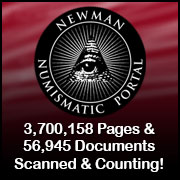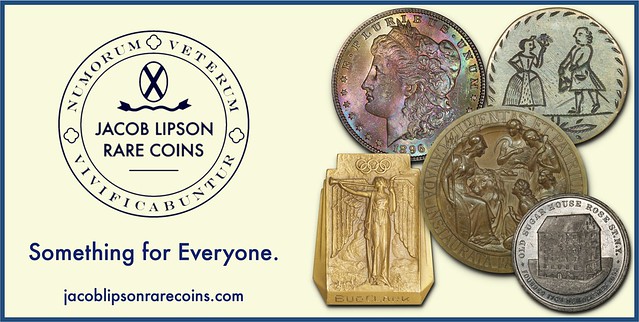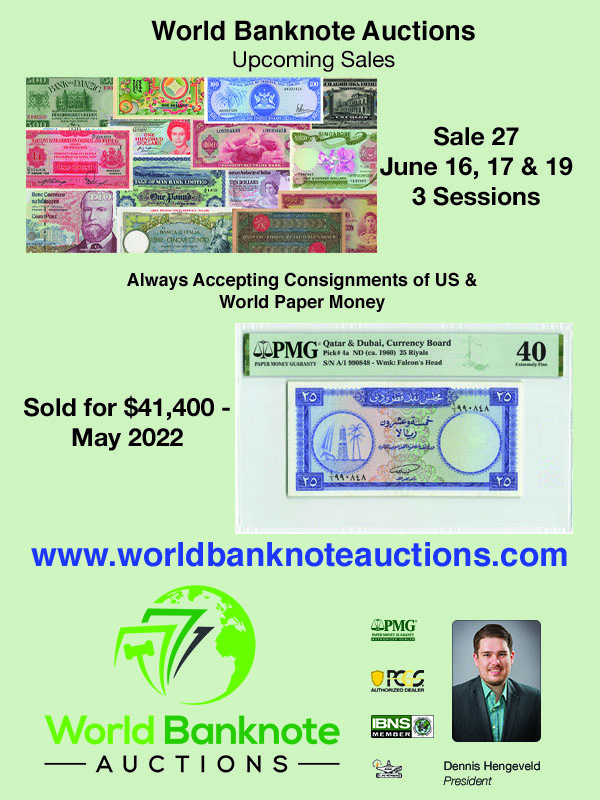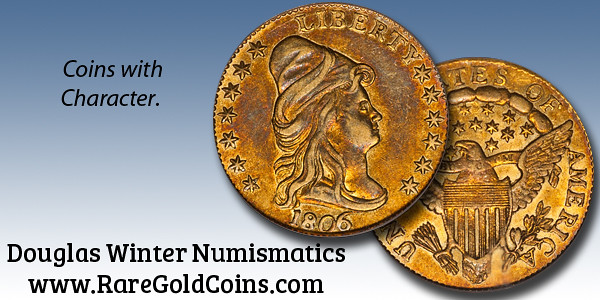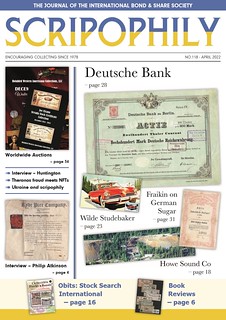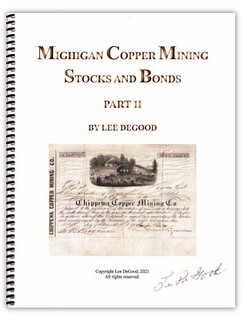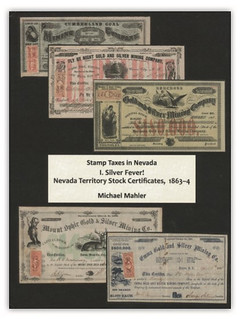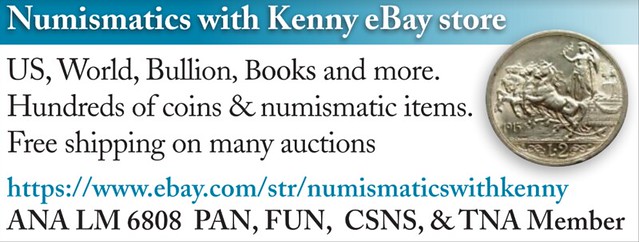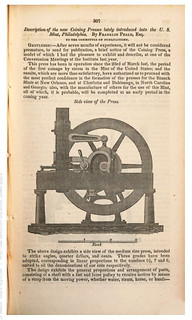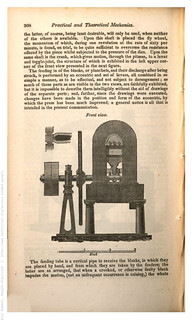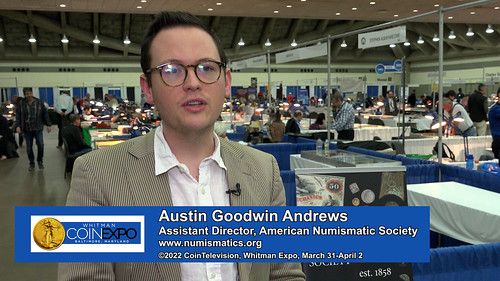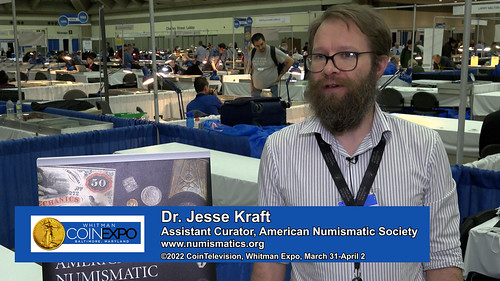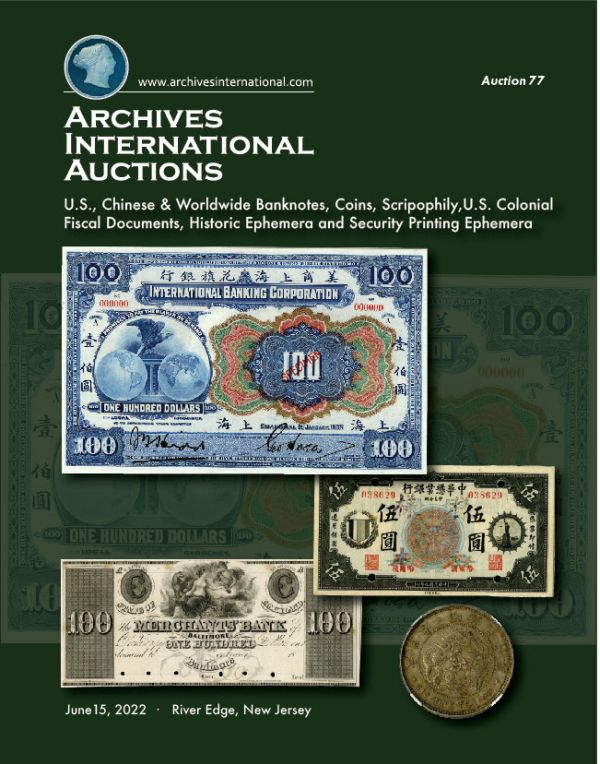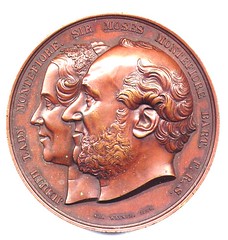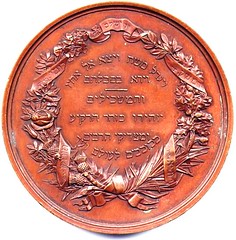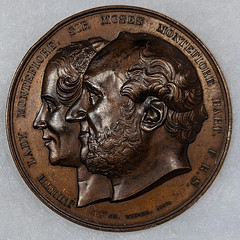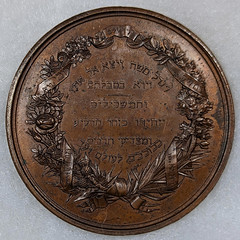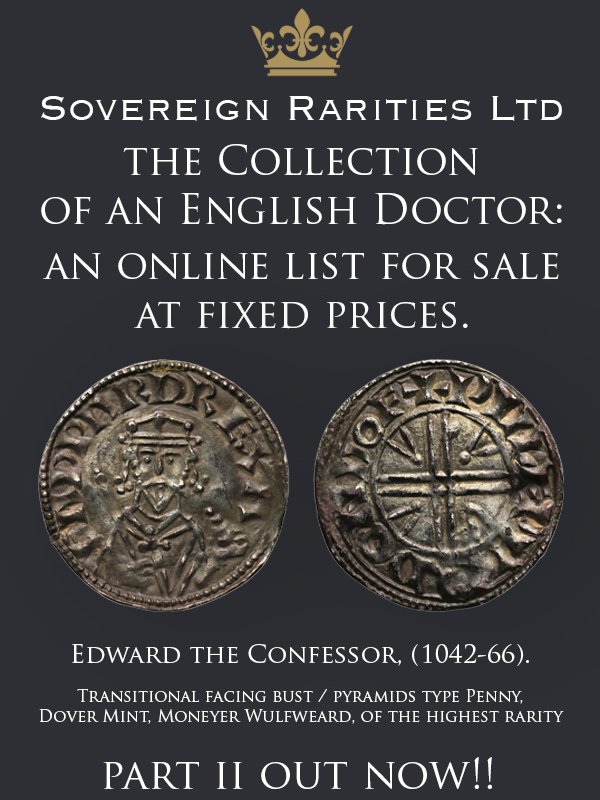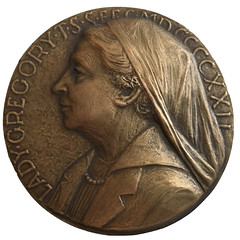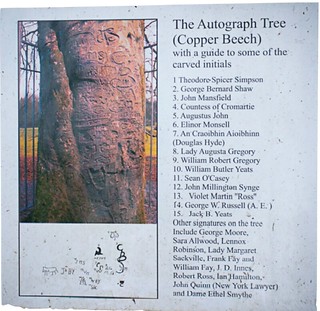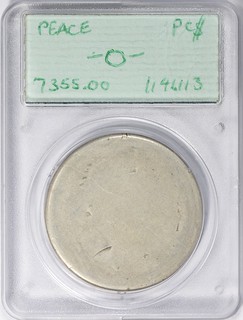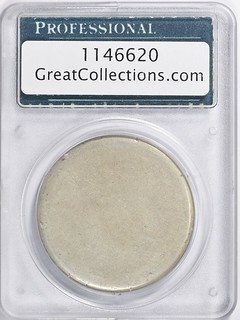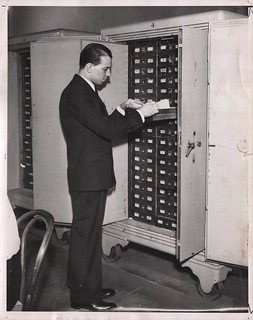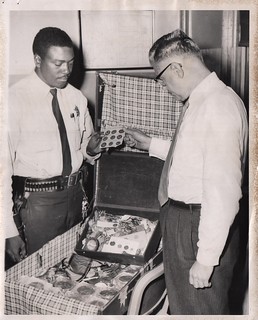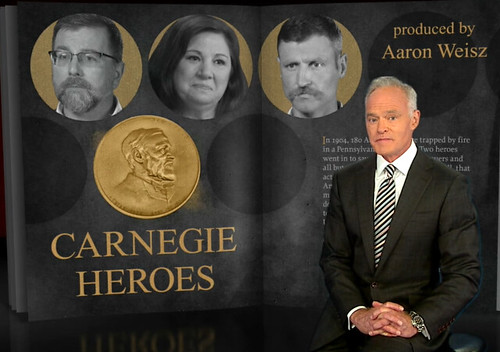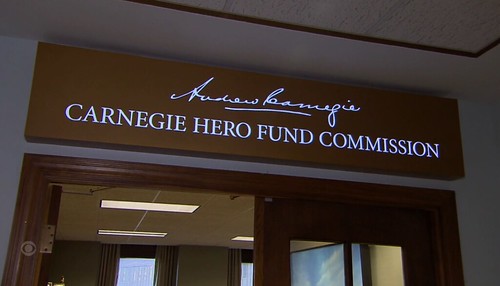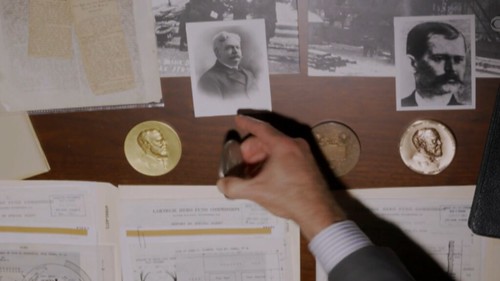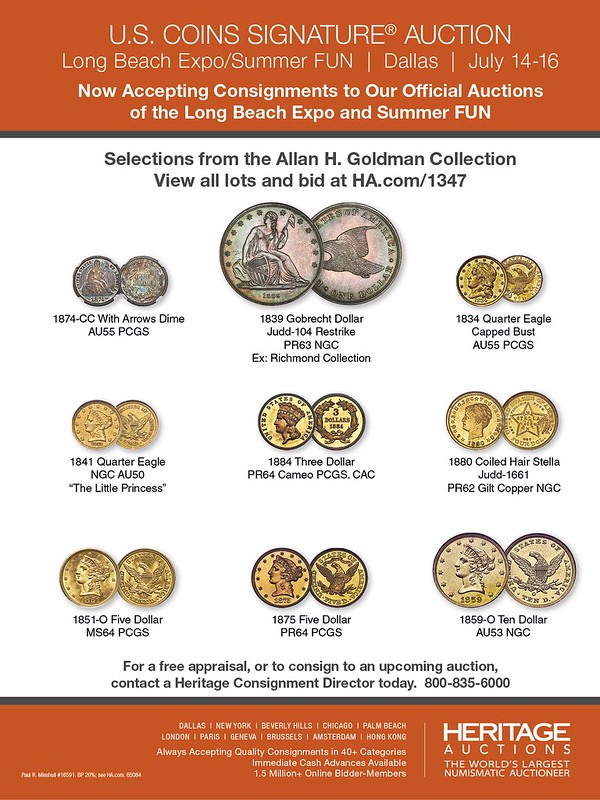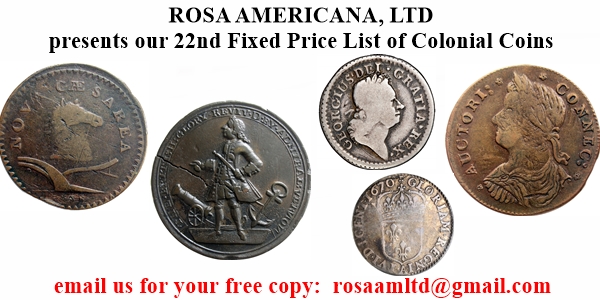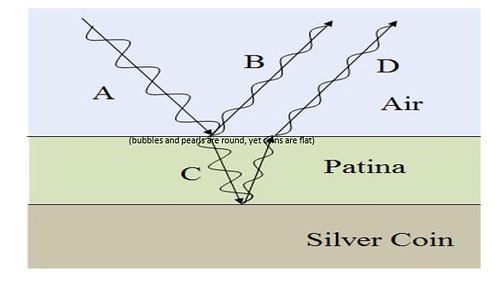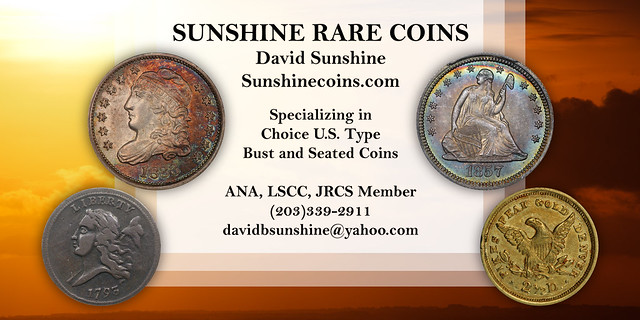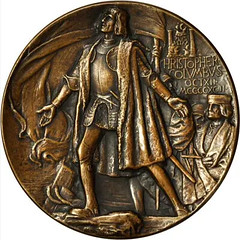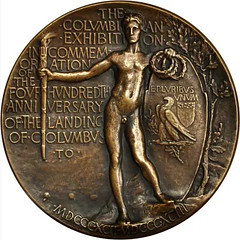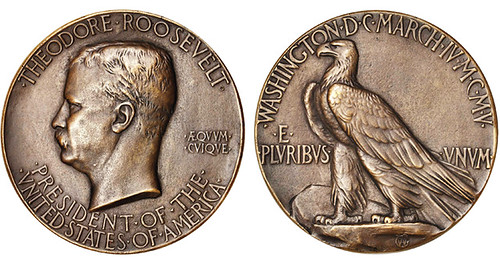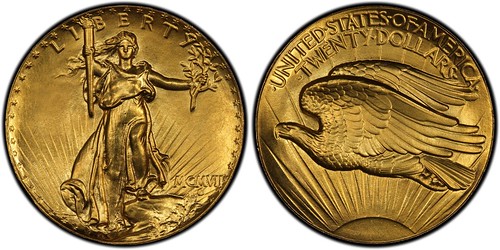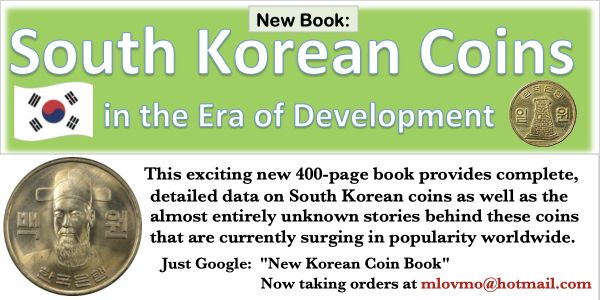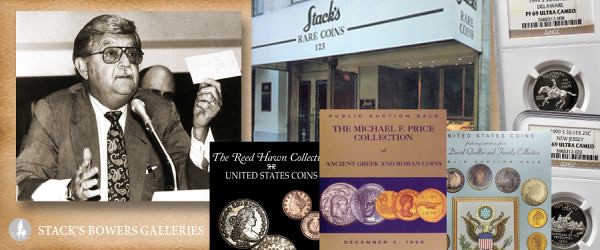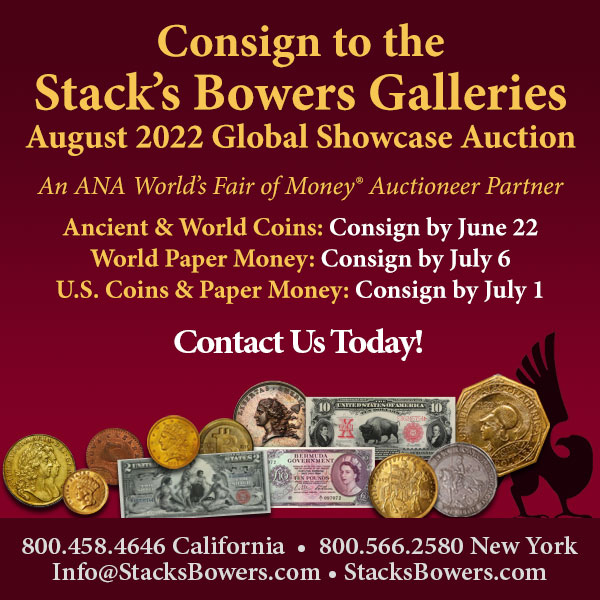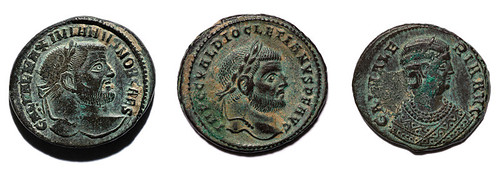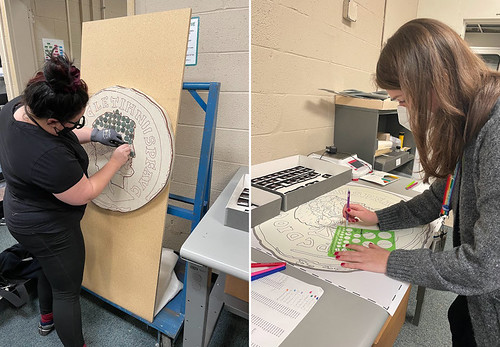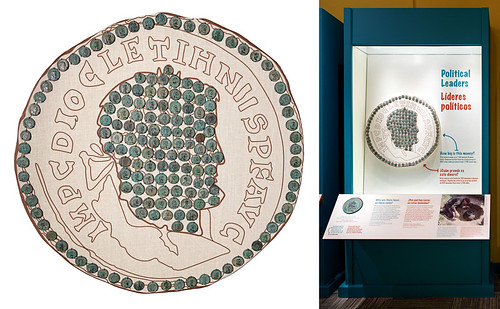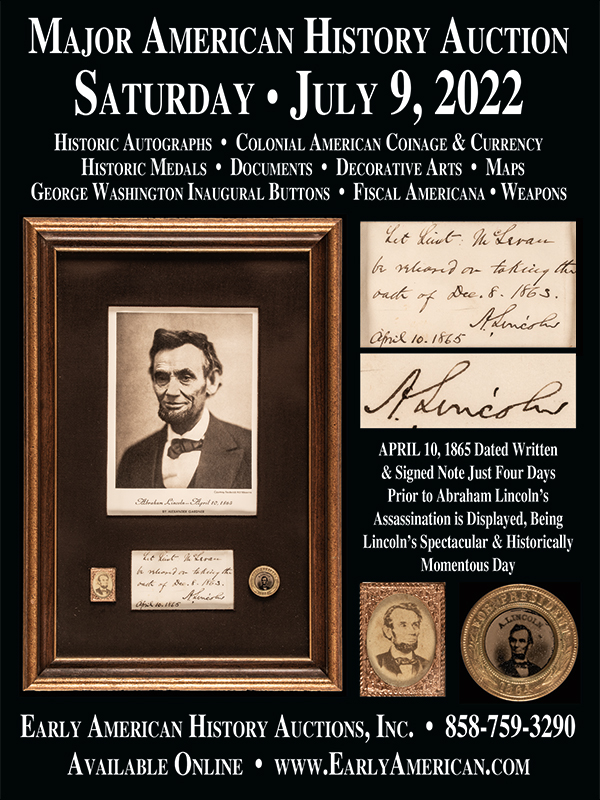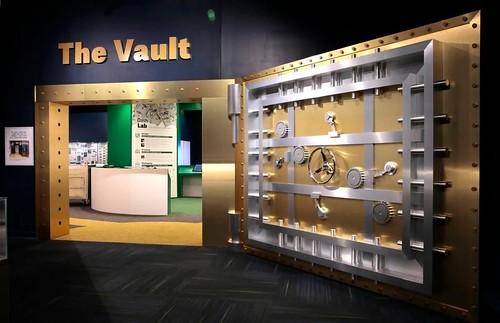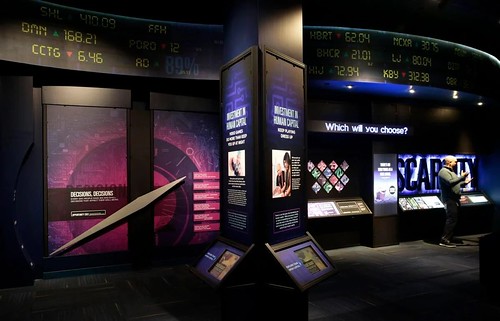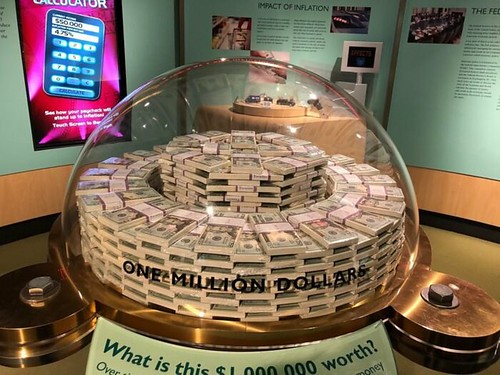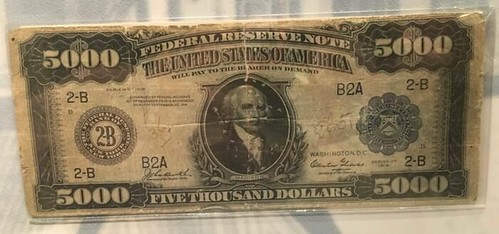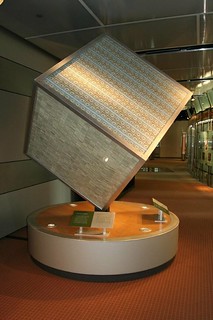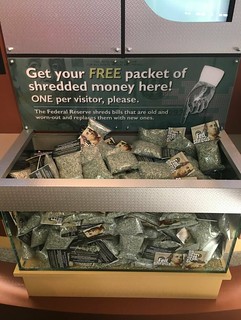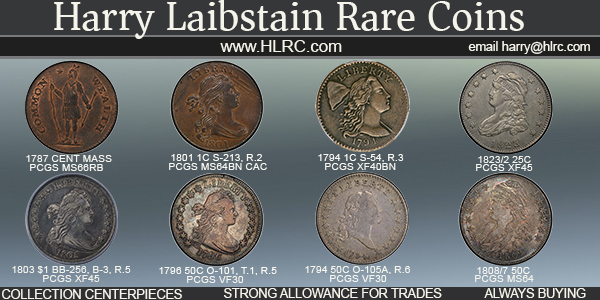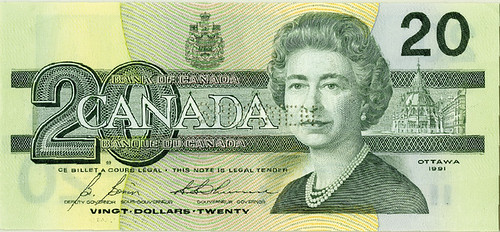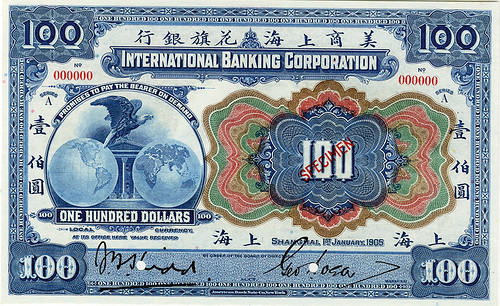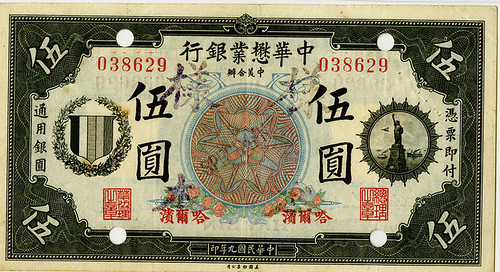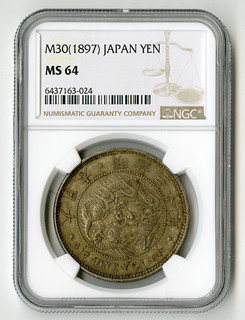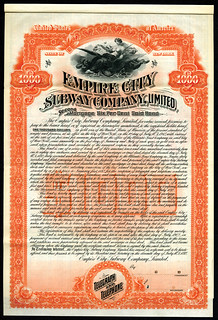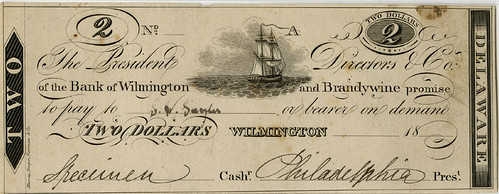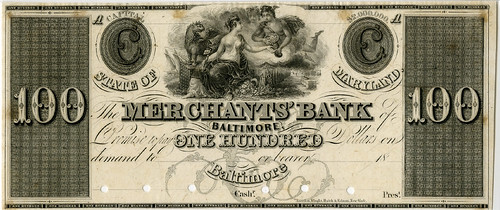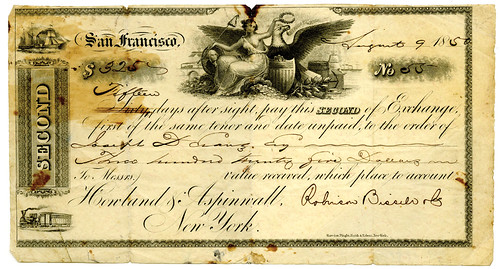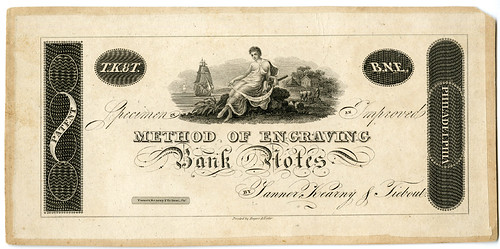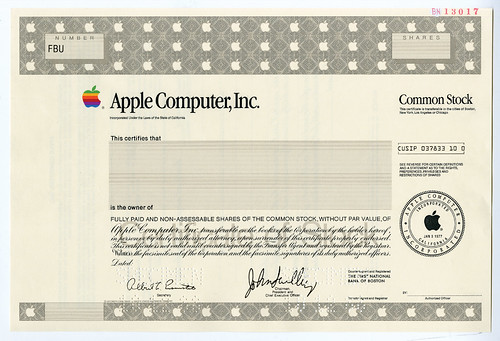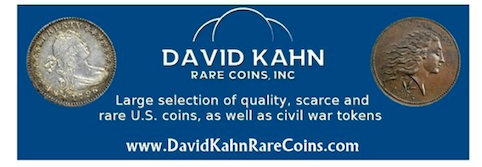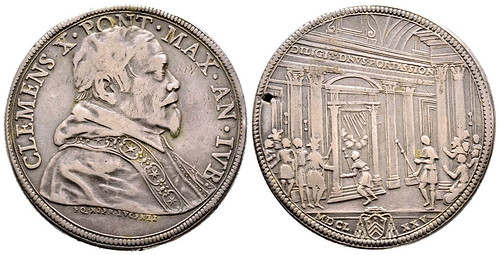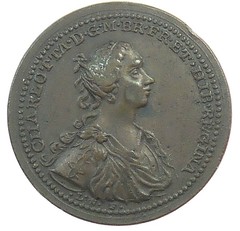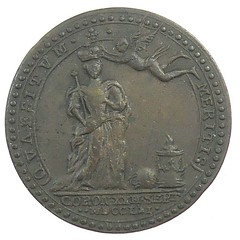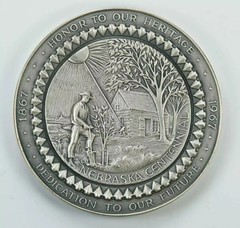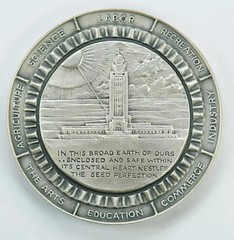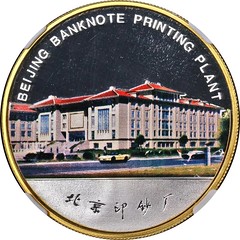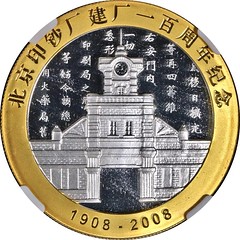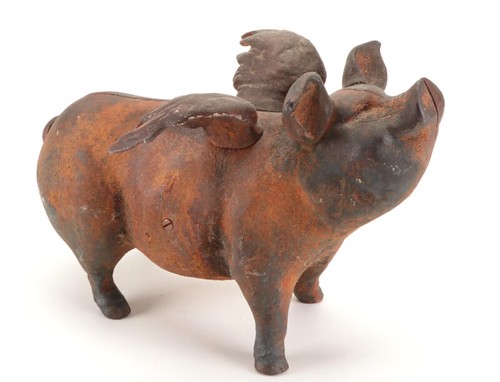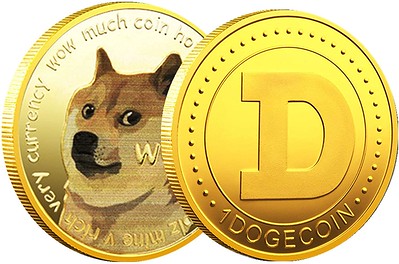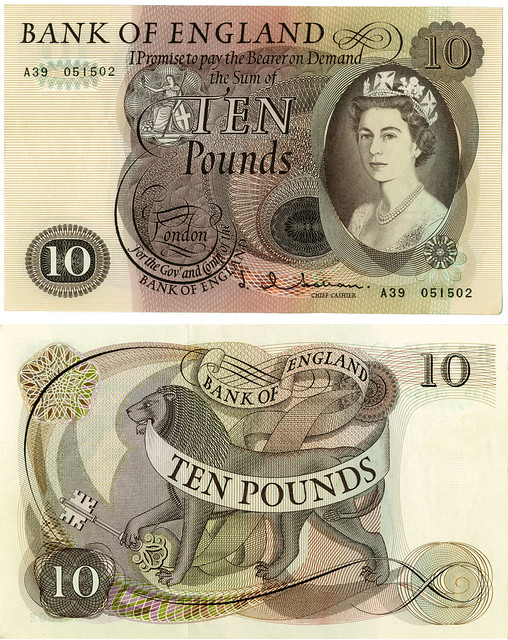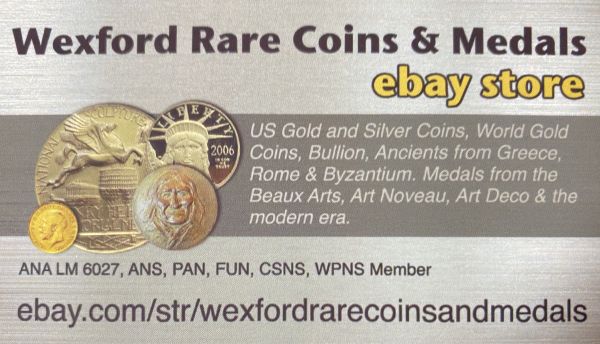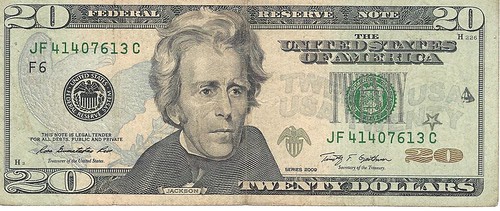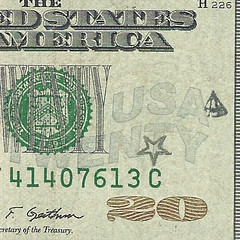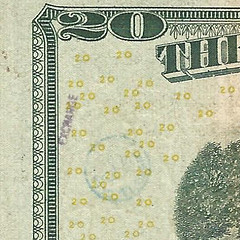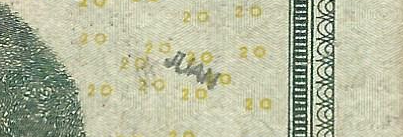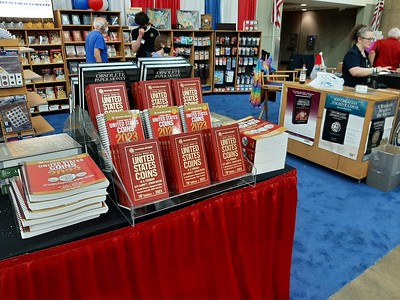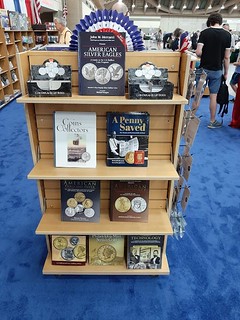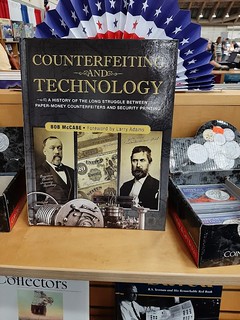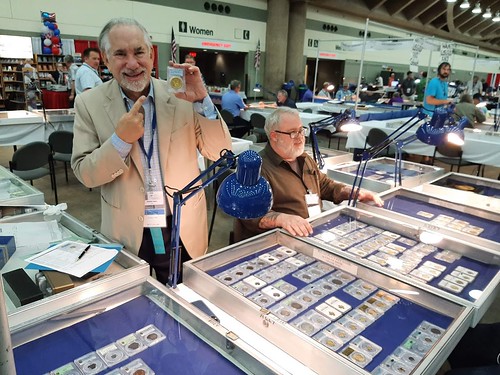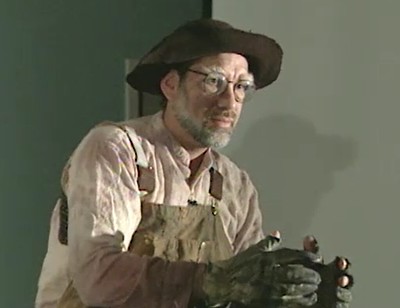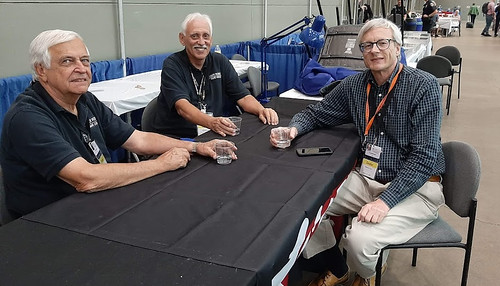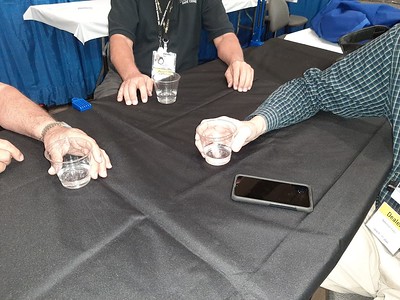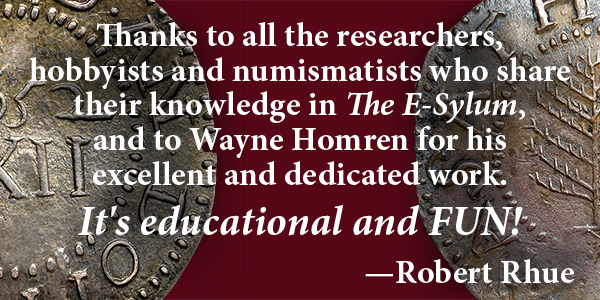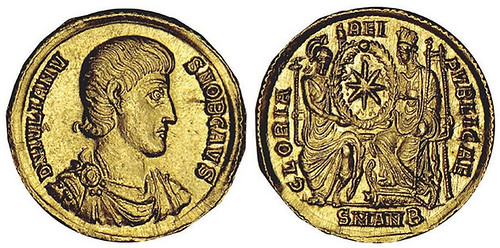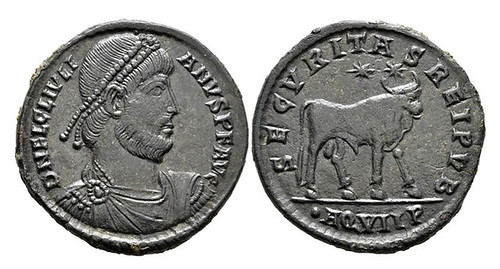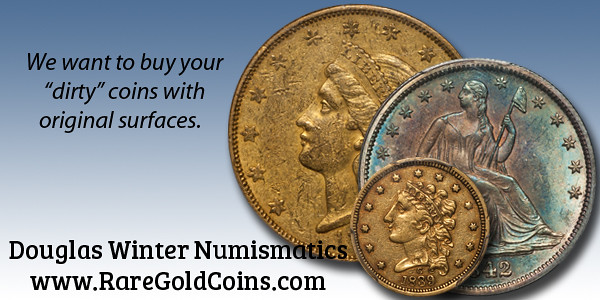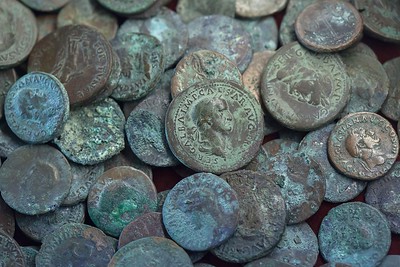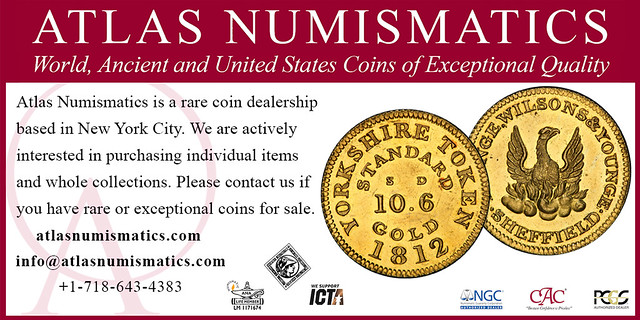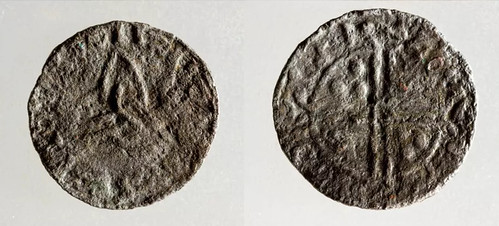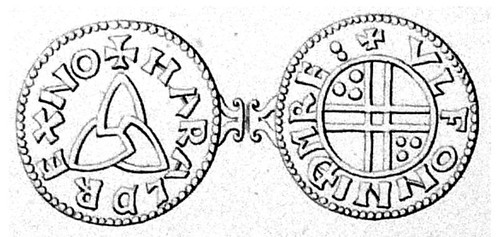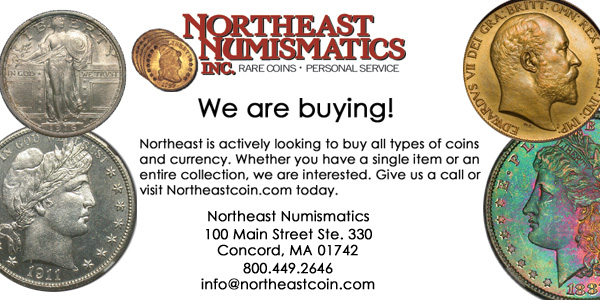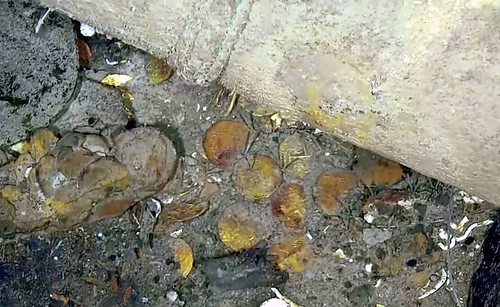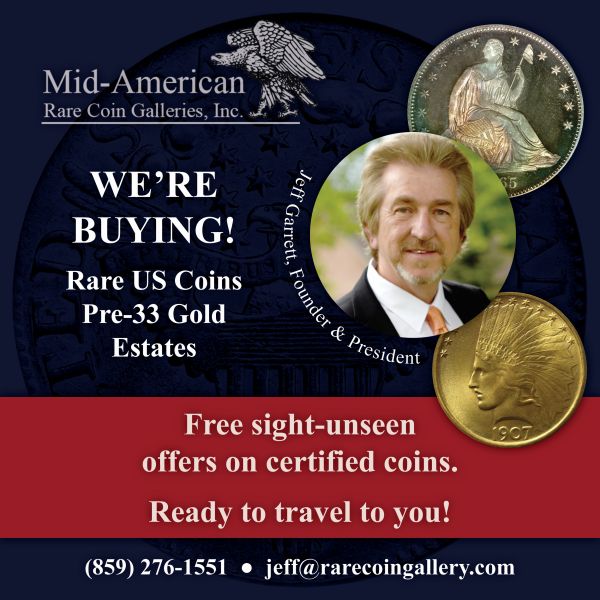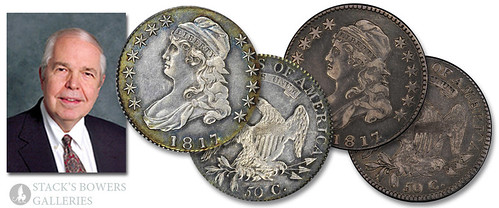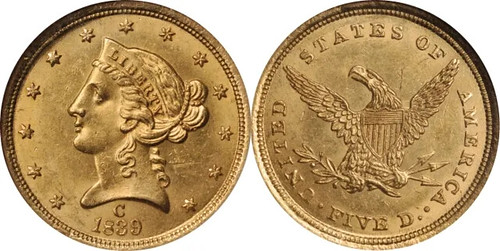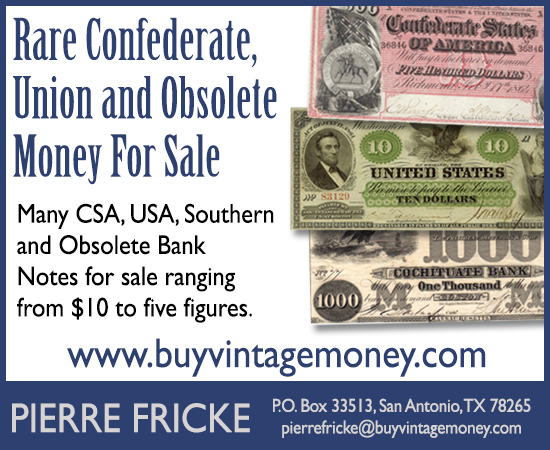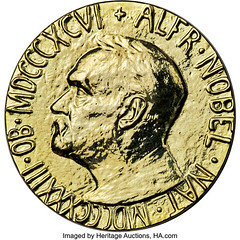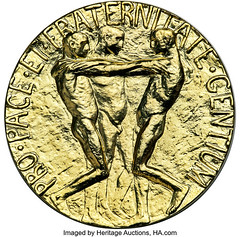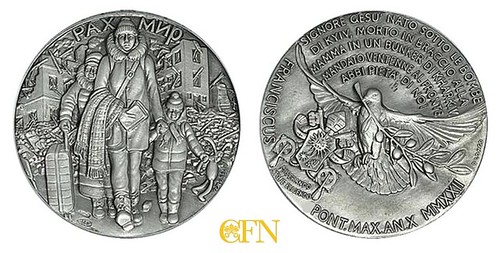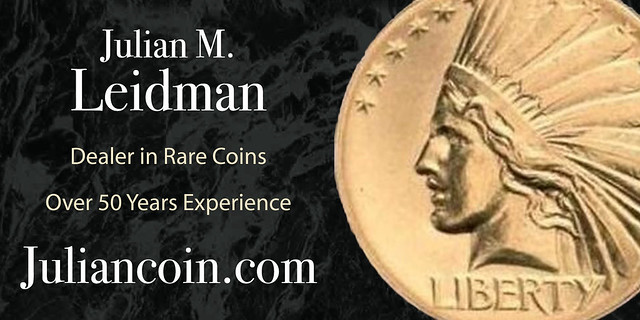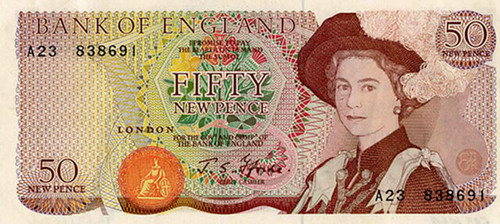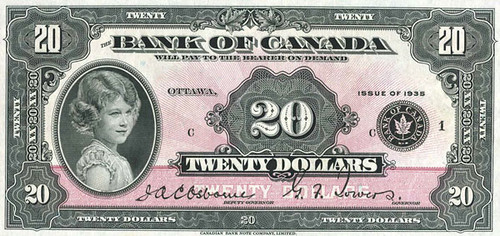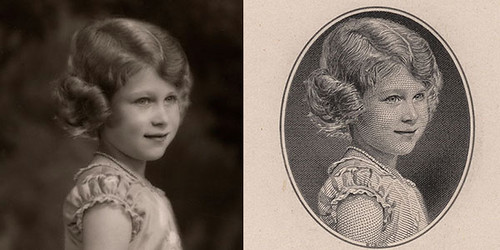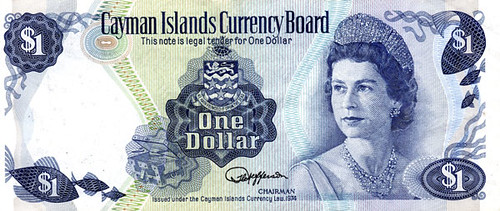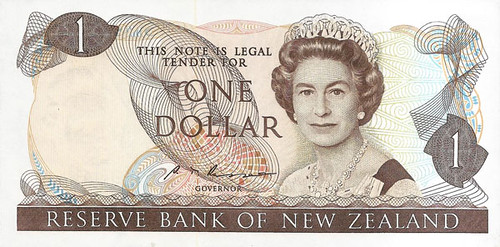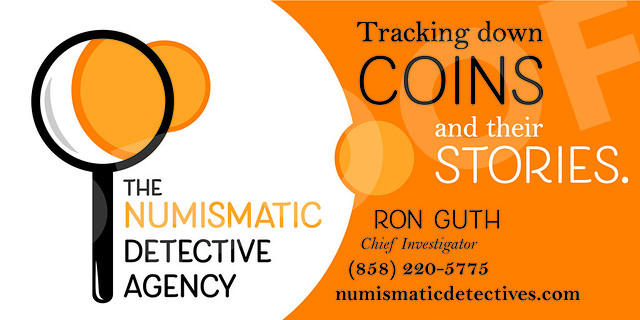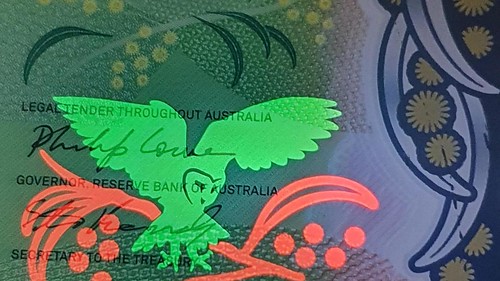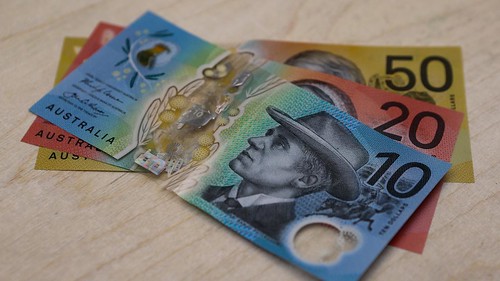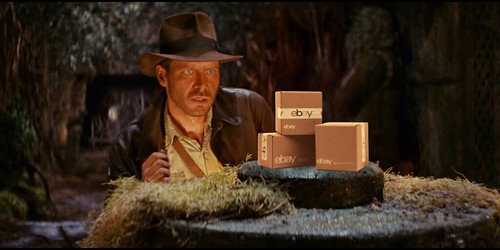
Visit our NBS Sponsors



About UsThe Numismatic Bibliomania Society is a non-profit association devoted to the study and enjoyment of numismatic literature. For more information please see our web site at coinbooks.org SubscriptionsThose wishing to become new E-Sylum subscribers (or wishing to Unsubscribe) can go to the following web page link MembershipThere is a membership application available on the web site Membership Application To join, print the application and return it with your check to the address printed on the application. Print/Digital membership is $40 to addresses in the U.S., and $60 elsewhere. A digital-only membership is available for $25. For those without web access, write to: Charles Heck, Treasurer AsylumFor Asylum mailing address changes and other membership questions, contact Chuck at this email address: treasurer@coinbooks.org SubmissionsTo submit items for publication in The E-Sylum, write to the Editor at this address: whomren@gmail.com BUY THE BOOK BEFORE THE COINSale CalendarWatch here for updates! |
- WAYNE'S WORDS: THE E-SYLUM JUNE 12, 2022
- NEW BOOK: MARY GILLICK
- NEW BOOK: COPPER COINS OF MUSCAT & OMAN
- SCRIPOPHILY APRIL 2022 ISSUE PUBLISHED
- NEWMAN PORTAL WELCOMES KELLEN HOARD
- PEALE'S 1836 REPORT ON THE NEW MINT COIN PRESS
- VIDEO: AUSTIN ANDREWS AND DR. JESSE KRAFT
- MORE ON THE MONTEFIORE MEDAL
- NOTES FROM E-SYLUM READERS: JUNE 12, 2022
- WHO WAS M.H. LINDERMAN?
- THOUGHTS ON IRIDESCENCE
- VOCABULARY TERM: JANVIER PANTOGRAPH
- AUGUSTUS SAINT-GAUDENS (1848-1907)
- HARVEY STACK'S NUMISMATIC FAMILY, PART 123
- MAKING THE REALLY BIG MONEY EXHIBIT
- THE ECONOMY MUSEUM AT THE ST. LOUIS FED
- THE MONEY MUSEUM AT THE CHICAGO FED
- ARCHIVES INTERNATIONAL AUCTION 77
- NUMISMATIC NUGGETS: JUNE 12, 2022
- WAYNE'S NUMISMATIC DIARY JUNE 12, 2022
- COINS OF JULIAN THE APOSTATE
- COINS FROM POMPEII'S RUINS
- HUNGARY FIND OF NORWAY'S KING HARALD COIN
- SAN JOSE GALLEON WRECK PHOTOGRAPHED
- THE 1817/4 HALF DOLLAR
- REDISCOVERING ELIASBERG'S 1839-C HALF EAGLE
- NOBEL PRIZE MEDAL SALE TO BENEFIT UKRAINIANS
- VATICAN MEDAL FOR UKRAINIAN WAR RELIEF
- ELIZABETH II'S IMAGE ON BANKNOTES
- MORE QUEEN ELIZABETH II BANKNOTE PORTRAITS
- AUSTRALIAN BANKNOTE FLUORESCENT INK IMAGES
- LOOSE CHANGE: JUNE 12, 2022
- FREDDIE MERCURY'S STAMP COLLECTION
Click here to read the thin version on the web
Click here to subscribe
Click here to access the complete archive
To comment or submit articles, reply to whomren@gmail.com
Content presented in The E-Sylum is not necessarily researched or independently fact-checked, and views expressed do not necessarily represent those of the Numismatic Bibliomania Society.
WAYNE'S WORDS: THE E-SYLUM JUNE 12, 2022
 New subscribers this week include:
Pedro Lousa of Portugal, courtesy Fred Liberatore;
Welcome aboard!
New subscribers this week include:
Pedro Lousa of Portugal, courtesy Fred Liberatore;
Welcome aboard!
Thank you for reading The E-Sylum. If you enjoy it, please send me the email addresses of friends you think may enjoy it as well and I'll send them a subscription. Contact me at whomren@gmail.com anytime regarding your subscription, or questions, comments or suggestions about our content.
This week we open with two new books and a new periodical issue, updates from the Newman Numismatic Portal, thoughts on iridescence, and more.
Other topics this week include Peale's 1836 report on the new mint coining press, the Montefiore medal, the Janvier pantograph, Augustus Saint-Gaudens, Federal Reserve money museums, auction previews, dug coins, sunken coins, a Nobel Peace Prize medal, Elizabeth II's image on banknotes, and the only living person other than members of the royal family to be depicted on a British stamp.
To learn more about sculptor Mary Gillick, coins of Muscat & Oman, Kellen Hoard, Austin Andrews, Jesse Kraft, Michael Powills, Officer Donald Sutherland, Liberty Dollars in coin show exhibits, Carnegie Heroes, the David Queller Family Collection, the World's Oldest Living Pioneer, and the flying pig piggy bank, read on. Have a great week, everyone!
Wayne Homren
Editor, The E-Sylum
NEW BOOK: MARY GILLICK
SPINK has published a new book on the work of sculptor Mary Gillick, known for her famous portrait of Queen Elizabeth II. -Editor
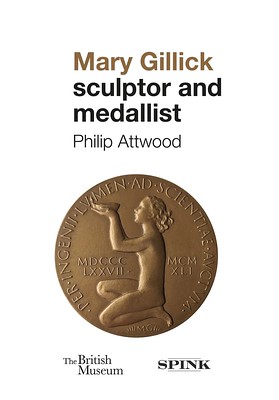 SPINK | BOOKS
SPINK | BOOKS
Mary Gillick: Sculptor and Medallist by Philip Attwood
£25.00
Mary Gillick, née Tutin (1881-1965), is probably best known for the portrait of Queen Elizabeth II that appeared on UK coins from the beginning of her reign until decimalisation in 1971. This book focuses on Gillick's career as a sculptor and medallist, which had already spanned more than fifty years when she experienced that sudden burst of fame. Her subjects range from First World War heroes to such eminent figures as the singer Kathleen Ferrier.
This is the first published study of this neglected British artist, which will be of interest to art historians and numismatists alike, and is released to coincide with the Mary Gillick Jubilee exhibition at the British Museum which opens on 2nd June 2022.
Published by Spink Books in association with the British Museum
Hardback
With colour illustrations throughout
216 pages | 170 x 240mm
For more information, or to order, see:
Mary Gillick: Sculptor and Medallist by Philip Attwood
(https://spinkbooks.com/products/mary-gillick-sculptor-and-medallist-by-philip-attwood)
The book is the catalog for Attwood's British Museum exhibit, "Mary Gillick: modelling The Queen's portrait." -Editor
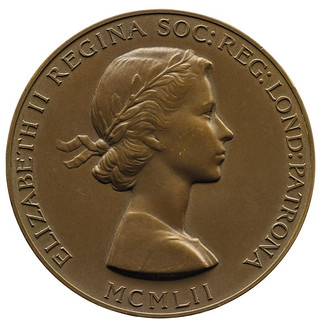 Seventy years ago the young Queen Elizabeth II sat down to have her profile immortalised, for the first time, on British currency – this display reveals the artist and the process behind the portrait.
Seventy years ago the young Queen Elizabeth II sat down to have her profile immortalised, for the first time, on British currency – this display reveals the artist and the process behind the portrait.
Celebrating Her Majesty The Queen's Platinum Jubilee year, this intriguing display presents the life and work of the sculptor Mary Gillick (1881–1965). Gillick enjoyed a burst of fame when, in her seventies, she was invited to model The Queen's head for the new coinage, released directly after her accession in 1952. The public were keen to celebrate their new monarch, and The Queen's newly minted likeness caused great excitement.
The show follows Gillick's long career, from her training in sculpture at London's Royal College of Art in the early 1900s, through her specialisation in medallic art, to her 1952 success and beyond. Gillick's extensive body of work includes cast medals showing an airman who shot down a Zeppelin over England during the First World War and prominent suffragette Ida Wylie. The work on display demonstrates Gillick's skill as a portraitist and as a designer and, with a 15th-century medal by Italian artist Pisanello, shows her debt to the Renaissance – a key element that fed into her portrait of Queen Elizabeth.
A highlight of the display will be items presented to the British Museum by the artist's family in 2005, which included medals created by Gillick from the 1910s to the 1950s, a set of large-scale plaster models of her portrait of The Queen, and insightful documents relating to the coins.
For more information, see:
The Asahi Shimbun Displays
Mary Gillick
modelling
The Queen's
portrait
(https://www.britishmuseum.org/exhibitions/mary-gillick-modelling-queens-portrait)
To read a CoinsWeekly article on the exhibit, see:
https://coinsweekly.com/british-museum-displays-mary-gillick-modelling-the-queens-portrait/
NEW BOOK: COPPER COINS OF MUSCAT & OMAN
Wolfgang Schuster passed along information about a new book on the copper coins of Muscat & Oman. Thanks. -Editor
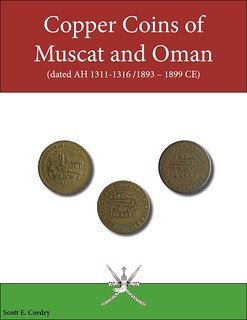 Copper Coins of Muscat and Oman dated AH 1311–1316 (1893–1899 CE)
Copper Coins of Muscat and Oman dated AH 1311–1316 (1893–1899 CE)
By Scott E. Cordry
Published by www.arabiancoins.com, New York 2021
Towards the end of the 19th century maritime trade between the major ports of the north-western Indian Ocean (Zanzibar, Aden, Muscat, Karachi and Bombay) greatly increased. Consequently, from 1893 to 1899, 1/4 Anna copper coins of Muscat and Oman were minted and circulated around the north-western Indian Ocean as regional small change. During these few years, numerous 1/4 Anna coins with a range of varieties of legends, decorative elements and die mulings as well as countermarks were struck. The book gives comprehensive information on these copper coins of Muscat and Oman bringing to light to all known varieties in a systematic presentation.
After a preface by the author reflecting his passion studying those issues, a detailed introduction by Dr. Wolfgang Schuster follows, which focuses on the historical and geographical background, use and importance of this ‘Indian Ocean trade currency'.
The series of Muscat and Oman 1/4 Anna copper coins spans across three generations of Omani rulers of the Al Bu Sa'id dynasty: Sultan Faisal bin Turki, Sultan Taimur bin Faisal and Sultan Sa'id bin Taimur. Accordingly, all coins issued under the respective rulers are grouped and presented in separate chapters which open with a brief biography of the sultan, followed by a detailed chronological listing of all known coin dates and varieties with illustrations.
As we only find some 1/4 Anna copper coins rather superficially covered in standard coin catalogs, the nearly 80 coin varieties presented in the book are identified by unique SC-catalog numbers as reference for coin collectors, coin dealers and numismatists.
An appendix shows all listed coins with their SC-number and estimated retail prices in three conditions in US$.
This first fully illustrated work sheds light on a relatively complicated and complex series that so far has not been researched in depth. Having cataloged and described dozens of varieties, this new catalog is a valuable reference to anybody wishing to explore the varieties and history of 1/4 Anna copper coins of Muscat and Oman.
For more information, or to order, see:
http://www.arabiancoins.com/
Book: Copper Coins of Muscat & Oman dated AH1311-1316 / 1893-1899 CE (New 2022)
(https://www.ebay.com/itm/255372226593)
SCRIPOPHILY APRIL 2022 ISSUE PUBLISHED
Editor Max Hensley submitted this information about the latest issue of Scripophily from the International Bond & Share Society. Thanks. -Editor
The Howe Sound Co
by Max Hensley
Selling the Security – Members Contribute
by Max Hensley
Studebaker
by Bernhard Wilde
Deutsche Bank Part I: The History of Deutsche Bank AG
by Horst Klophaus
Boomtimes in the German Sugar Industry: 1850 – 1885
by Michael Fraikin
Included are reviews of two new books on stock certificates: Michigan Copper Mining Stocks and Bonds Part II by Lee Degood and Stamp Taxes in Nevada I. Silver Fever! Nevada Territory Stock Certificates, 1863-4 by Michael Mahler.
For more information on the International Bond & Share Society, see:
https://scripophily.org/
NEWMAN PORTAL WELCOMES KELLEN HOARD
The latest news from the Newman Numismatic Portal is about their new intern, Kellen Hoard. Project Coordinator Len Augsburger provided the following report. -Editor
Newman Portal Welcomes Kellen Hoard
 Newman Portal is pleased to announce that Kellen Hoard has accepted a summer internship with the Eric P. Newman Numismatic Education Society. Kellen Hoard is a recently graduated high school student from Kirkland, Washington, who has been collecting since he was 9 years old. Named Young Numismatist of the Year by the American Numismatic Association in 2021, Hoard has written widely for hobby publications, including The Numismatist, and is a board member of the Pacific Northwest Numismatic Association.
Newman Portal is pleased to announce that Kellen Hoard has accepted a summer internship with the Eric P. Newman Numismatic Education Society. Kellen Hoard is a recently graduated high school student from Kirkland, Washington, who has been collecting since he was 9 years old. Named Young Numismatist of the Year by the American Numismatic Association in 2021, Hoard has written widely for hobby publications, including The Numismatist, and is a board member of the Pacific Northwest Numismatic Association.
Hoard is politically active and has worked with the Washington State Legislature and in varying campaign roles. He served as Chair of the Legislative Youth Advisory Council, the official youth advisory body to the state legislature, where he spearheaded the writing and passage of HB 1373, which expanded mental health support access to 1.1 million Washington students. For his work in politics and advocacy, he was recognized as the Washington State Parent Teacher Association Outstanding Student Advocate of the Year, was selected as one of seven emerging national leaders by the Harvard Institute of Politics, and was chosen as a Cameron Impact Scholar, for which he received a full scholarship to any college of his choice. Hoard will be attending George Washington University in the fall.
THE BOOK BAZARRE
PEALE'S 1836 REPORT ON THE NEW MINT COIN PRESS
Locating new material for the Newman Numismatic Portal is typically a pretty methodical process, but sometimes serendipity plays a part. While searching online literature listings recently I came across a reference to an 1837 article in the British publication Mechanics Magazine titled "The New Coining-Press Of The United States Mint, Philadelphia." I passed the information on to NNP Project Coordinator Len Augsburger and he discovered that the UK article is a reprint of an article from the November 1836 Journal of the Franklin Institute. It's now been added to NNP. Here are a couple of the pages. -Editor
To read the complete article on NNP, see:
Description of the New Coining Press Lately Introduced Into the U.S. Mint, Philadelphia
(https://nnp.wustl.edu/library/book/615677)
VIDEO: AUSTIN ANDREWS AND DR. JESSE KRAFT
These are selections from the David Lisot Video Library that feature news and personalities from the world of coin collecting. David has been attending coin conventions since 1972 and began videotaping in 1985. The Newman Numismatic Portal now lists all David's videos on their website at:
https://nnp.wustl.edu/library/multimediadetail/522852
Here's one with interviews of ANS staffers Austin Andrews and Jesse Kraft. -Editor
American Numismatic Society Membership Offers Benefits for Serious Coin Collectors.
VIDEO: 5:16.
Austin Goodwin Andrews, Assistant Director of Membership and Development,
Dr. Jesse Kraft, Assistant Curator of American Numismatics,
David Lisot, Interviewer, CoinTelevision.com.
April 2, 2022.
The American Numismatic Society is a world class collector organization devoted to the study of coins, tokens and medals. Curator Jesse Kraft and Director Austin Goodwin Andrews talk about the benefits of membership and how the ANS can in help numismatic research.
David adds:
"The American Numismatic Society has new blood to champion the cause of numismatics. Hear from some of the new players the energy and zeal the bring to our hobby of numismatics and why membership in ANS can be so beneficial."
An excerpt of the video is available for viewing on the Coin Television YouTube Channel at:
https://youtu.be/HdAsvf-ZI5k
MORE ON THE MONTEFIORE MEDAL
Ira Rezak writes:
"You asked for a clearer picture of the Wiener medal of Montefiore. See attached."
Bill Rosenblum writes:
"Another great issue as always and I wanted to reply to your query about the Sir Moses and Lady Judith Montefiore Medal.
"I sold 4 or 5 of these medals in my auctions from the mid-1990s through 2010 or so. And I've owned 2 or 3 of these over the years which I have sold at shows and/or via Fixed Price lists. I've always considered it one of the best "Jewish" medals I've handled. Not only does it honor two important Jewish historical figures but it was also done by a famed Jewish medallist. Montefiore is considered the most important Anglo-Judaic figure of the 19th century by most historians.
"It is listed in Dan Friedenberg's Jewish Minters & Medalists (page 53) and Sylvia Haffner's Judaic Tokens and Medals (PEM 4c). Also listed in British Historical Medals by Laurence Brown (2802A) and Chris Eimer's British Commemorative Medals and Their Values (1569). It exists in silver, bronze and white metal. The Encyclopedia Judaica (1971) lists it as one of the most important Jewish Emancipation medals ever issued as did the Jewish Encyclopedia (1906)."
Jonathan Brecher writes:
"I bought the one in the auction listing. I've seen this medal before. It shows up from time to time. Stack's sold an AU example in 2010 for $1380. That price is very high. Noonan's has sold several, at prices in the $300-400 range. The current example seems to have a large rim ding and maybe some scuffs. I expect it's worth "less".
"I'm attaching pics, although the original auction photos were pretty accurate. The third pic is interesting. That's taken edge-on, from the 9:00 position. The relief on this medal is amazing!"
Indeed! Thanks, everyone! -Editor
To read the complete article, see:
LADY AND SIR MOSES MONTEFIORE MEDAL
(https://www.coinbooks.org/v25/esylum_v25n22a29.html)
NOTES FROM E-SYLUM READERS: JUNE 12, 2022
Book Review: Robert Scot
Bill Eckberg writes:
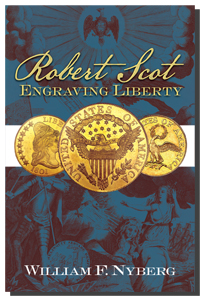 "It was nice to see a new printing of Nyberg's book on Robert Scot is in print. The book contains a wealth of information about the man who was the first Chief Engraver of the US Mint, responsible for the Capped Bust coppers, all the Draped Busts (copper, silver and gold), and most likely later designs until his death in 1823.
"It was nice to see a new printing of Nyberg's book on Robert Scot is in print. The book contains a wealth of information about the man who was the first Chief Engraver of the US Mint, responsible for the Capped Bust coppers, all the Draped Busts (copper, silver and gold), and most likely later designs until his death in 1823.
"Reading the review was an interesting experience. I, of course, approach Scot as a numismatist. The review approached him as a native Scot. The reviewer seems to have found Scot's coinage work confusing, and was heavy on the Scottish Enlightenment. For most of us at The E-Sylum, I'm sure the opposite would be true."
To read the earlier E-Sylum article, see:
NEW PRINTING: ROBERT SCOT: ENGRAVING LIBERTY
(https://www.coinbooks.org/v25/esylum_v25n23a03.html)
More on The Coin Collector
Clifford Mishler writes:
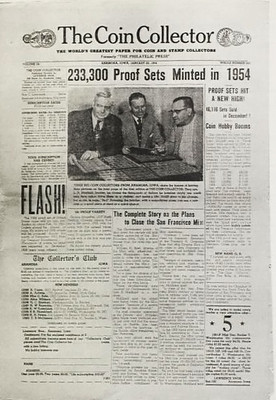 "The Lawrence Bros. publication -- The Coin Collector – was more a house organ than a true newspaper or trader. It originated back in the mid-1940s as
"The Lawrence Bros. publication -- The Coin Collector – was more a house organ than a true newspaper or trader. It originated back in the mid-1940s as The Philatelic Press
– the World's Greatest Paper for Precancel Collectors
– morphing into being represented as The World's Greatest Paper for Stamp and Coin Collectors.
It was renamed as The Coin Collector,
effective with the December 1954 edition. Sometime in the mid-1960s it passed to the Antique Trader,
after having had at least one other interim owner as I recall. Most issues typically featured a headlined article on page one describing and pricing a collector issue . . . which could be purchased more competitively from a house ad inside . . . be it a modern proof set, classical commemorative, or other item.
"Krause Publications had introduced a new tabloid trader publication – Coin Shopper – bearing a cover date of September 1967. In early 1968 we assumed the title and mailing list from Ed Babka of the Antique Trader,
combining it with our existing title – as the Coin Collector and Shopper
– for which publication was continued through the issue of December 1969, at which time the mailing list and certain feature columns were merged into Numismatic News.
Among the features transferred were Under the Glass
by a young David Ganz, World Coin Commentary
by Robert L. Clarke, Lore of Numismatics
by Maurice M. Gould, and Token and Medal Carnival
by Arlie R. Slabaugh, numismatists of significant renown.
"While I have a couple bound volumes in my library embracing those 1967 to 1969 issues, I don't possess any of the old Coin Collector/Philatelic Press issues from the earlier years."
Thanks! Very useful background. I didn't have time to search for it last week, but we did discuss the topic before - see the link below for more. -Editor
To read earlier E-Sylum articles, see:
MORE ON THE COIN COLLECTOR
(https://www.coinbooks.org/v24/esylum_v24n26a15.html)
THE COIN COLLECTOR NEWSPAPER SOUGHT
(https://www.coinbooks.org/v25/esylum_v25n23a14.html)
The Theodore Spicer-Simson Lady Gregory Medal
Scott Miller writes:
"I was pleased to see your mention of the Lady Gregory medal, as I was not aware of it previously. There is another Lady Gregory medal which might be of interest. It is a uniface, cast bronze medal, 75mm in diameter, and the work of Theodore Spicer-Simson, who made it at the suggestion of William Butler Yeats. Dated 1922, it was created at the same time that Spicer-Simson was producing his series of "Men of Letters of the British Isles". According to his autobiography "A Collector of Characters", Spicer-Simson was staying with Lady Gregory at her estate, Coole Park, while he was working on his medal of Yeats. Lady Gregory had a large copper beech, known as "the autograph tree" where eminent guests cut their initials, Spicer-Simson's TSS monogram can still be seen on it today."
Interesting - thanks. -Editor
To read the earlier E-Sylum article, see:
THE LADY GREGORY MEDAL
(https://www.coinbooks.org/v25/esylum_v25n23a30.html)
PCGS Prototype With Handwritten Label
Tom Caldwell of Northeast Numismatics writes:
"I noticed a rather strange piece being offered by Great Collections this week."
Peace Silver Dollar PCGS Prototype Handwritten Label OGH (1st Gen)
A fascinating early PCGS prototype label, showing how a coin with an unknown date could be certified by PCGS as a type coin. This particular Peace dollar no longer has any of the date showing, and it was assigned PCGS # 7355.00 (7355 is the PCGS # for the Peace Dollar type) and certification number 1146113 (which is not valid in the PCGS database, likely because it was never part of an official submission #/pick-up; certification numbers generally go live when they are picked up by the submitter).
This was produced in 1989/1990, with handwriting confirmed to be by PCGS employee Steve Rocky. In addition, PCGS has recently confirmed the holder, label and coin are all genuine and has not been tampered with in any way.
Strange to say the least - but fascinating nonetheless. Nice piece of numismatic history. -Editor
To read the complete lot description, see:
Peace Silver Dollar PCGS Prototype Handwritten Label OGH (1st Gen)
(https://www.greatcollections.com/Coin/1146620/Peace-Silver-Dollar-PCGS-Prototype-Handwritten-Label-OGH-1st-Gen)
Old Numismatic Photos
Dave Lange writes:
"I'm still finding interesting old numismatic photos for purchase online, and I'm attaching scans of a couple recent acquisitions.
"The first is dated February 16, 1937 and shows an employee of the Scott Stamp and Coin Company in NYC going through a filing cabinet within one of several mobile safes. Presumably, this is how the coin inventory was stored at the time. I don't recognize the man in the photo, but some readers may. Of course, Scott was the primary distributor of Wayte Raymond's National Coin Album until right about this time, when Raymond discontinued that relationship, so the photo is of dual interest to me.
"The second image is accompanied by a clipping from an unidentified newspaper, though it's likely from Chicago. The man at right is numismatist Michael A. Powills, who has a brief entry in Pete Smith's American Numismatic Biographies. The other man is Officer Donald Sutherland, who recovered a portion of the items stolen from Powills while the latter was away at a Portland, Oregon coin convention. Since the photo is dated September 2, 1959 that event must have been the recent ANA Convention in Portland. This photo was taken at the Maxwell (street?) Station, and the clipping reveals that the coins and medals stolen were valued at $50,000, a very large sum for a numismatic collection at that time. Unfortunately, the pieces recovered and shown in the photo amounted to just $5-10,000. They were found by the officer within a suitcase under a tree in the South Side of Chicago at Union Avenue and South 14th Street. Typical of that time, the newspaper included Powills' home address, just in case someone wanted to steal the material recovered!"
Thanks - very nice! Great numismatic ephemera. -Editor
On Banning Liberty Dollar Exhibits
An E-Sylum reader writes:
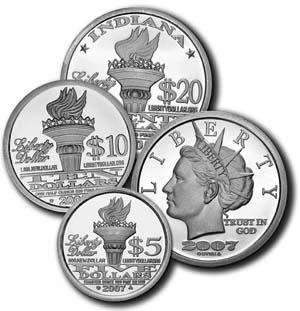 "This note doesn't have to do with the latest E-Sylum (another superb job by the way) but regards an article you wrote for TAMS way back in March 2013. It was titled "CSNS Bans Liberty Dollars" and was about Bernard on NotHaus and his Liberty dollar (yes, I'm a little behind on my reading).
"This note doesn't have to do with the latest E-Sylum (another superb job by the way) but regards an article you wrote for TAMS way back in March 2013. It was titled "CSNS Bans Liberty Dollars" and was about Bernard on NotHaus and his Liberty dollar (yes, I'm a little behind on my reading).
"In the article you correctly predicted that no one in the hobby would stand up for Bernard ("are we all going to be weenies?") because there were "no powerful hobby voices with a vested interest". I totally agree and think Bernard got shafted, both by the government and by the hobby.
"Bernard is a very interesting character and he traveled the country in his Cadillac peddling his dollars from the trunk of his car while peddling his ideas with his tongue. He passed through my town quite a few times and he and I would meet at his motel room for long discussions about monetary policy, minting (he owned the Royal Hawaiian Mint and produced many delightful pieces), free speech, the government and coin collecting in general. He actually is an extremely sharp guy and I don't think he was trying to do anything except draw attention to the faults of the Federal Reserve system and fiat-back currency. In that he may have been a bit too successful, but he should NEVER have gone to jail and certainly not for counterfeiting. It was one of several times the hobby en toto has disappointed me on a collective level.
"Anyway, great piece and belated thanks for sticking up for good old Bernard. You get and deserve props for what you are doing now; here's some kudos for what you did ten years ago. Thanks."
The TAMS Journal republished a piece I originally wrote in The E-Sylum. Here's an excerpt - see the full articles linked below. I was sticking up for the coins as numismatic items. So... are Liberty Dollars still verboten as exhibit items anywhere? How about eBay sales? -Editor
As noted in the previous article, eBay and the Central States Numismatic Society have banned Liberty Dollars from their venues. Humbug! I'm too young to be an old hippie, but I think the government is way overreaching on this. I understand CSNS' position, but wish the numismatic community would take a stand on the issue. Fighting these fights isn't always futile. The hobby worked with the government to roll back oppressive rules on the trading of Confederate currency, and the lawsuit over the seized Farouk 1933 $20 gold piece resulted in its legalization. Are we all gonna be weenies and roll over on this one?
Probably. There may be a small collector community for Liberty dollars, but no powerful hobby voices with a vested interest. But if Liberty Dollars are banned, what about other alternate currencies, past and present? Are Ithica Hours counterfeits? What about Nickolas Veeder's Eutopia dollars or Lewis Feuchtwanger's issues? They were proposed alternative coins, too.
To read the earlier E-Sylum articles, see:
CENTRAL STATES NUMISMATIC SOCIETY BANS LIBERTY DOLLARS
(https://www.coinbooks.org/esylum_v15n53a13.html)
DO LIBERTY DOLLARS DESERVE TO BE BANNED?
(https://www.coinbooks.org/esylum_v15n53a14.html)
More on Pratt's Nathan Hale Statue
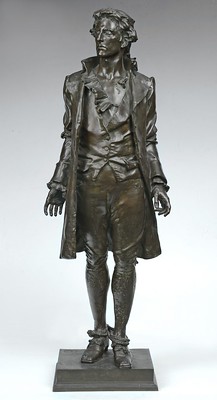 Robert Goler writes:
Robert Goler writes:
"I believe that there is a small addendum for the recent Bela Pratt bio. While it is true that Pratt sculpted the Nathan Hale statue for at Yale, one that was put on display in NYC's City Hall and copied widely in the early 20th century was a similar commission created by Frederick Macmonnies."
For more information, see:
Statues of Nathan Hale
(https://www.americanrevolutioninstitute.org/masterpieces-in-detail/nathan-hale-statues/)
Thank you. -Editor
To read the earlier E-Sylum article, see:
BELA LYON PRATT II (1867-1917)
(https://www.coinbooks.org/v25/esylum_v25n23a17.html)
Washington Crossing the Delaware Quarter Initials
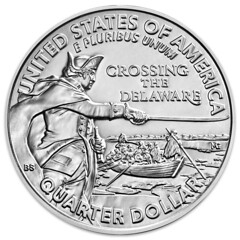 Last week I asked about the initials BS and MG on the 2021 Washington Crossing the Delaware quarter. Pete Smith came through with the answer.
Thanks.
-Editor
Last week I asked about the initials BS and MG on the 2021 Washington Crossing the Delaware quarter. Pete Smith came through with the answer.
Thanks.
-Editor
- Sculptor MG: Michael Gaudioso, Medallic Artist
- Designer BS: Benjamin Sowards, Artistic Infusion Program
To read the earlier E-Sylum article, see:
NOTES FROM E-SYLUM READERS: JUNE 5, 2022 : George and God
(https://www.coinbooks.org/v25/esylum_v25n23a13.html)
Carnegie Heroes on 60 Minutes
Last Sunday 60 Minutes aired a segment on the Carnegie Hero Fund Commission and the heroes awarded medals. Below is a link to the full episode; the segment starts around the 29:12 mark. Thanks to Steve Bishop for pointing this out. Were Carnegie Heroes born heroic? -Editor
To watch the complete episode/segment, see:
6/5/2022: The Longest Running Oil Spill, Canada's Unmarked Graves, Carnegie Heroes
(https://www.cbsnews.com/video/60minutes-2022-06-05/)
WHO WAS M.H. LINDERMAN?
A letter found in the American Numismatic Society archives from an M.H. Linderman
prompted speculation that the writer might have been related to former U.S. Mint Director H.R. Linderman. Julia Casey did some sleuthing on this and provided these notes. Thank you!
-Editor
Regarding the identity of M.H. Linderman
– I believe I found a likely candidate in Minert H. Linderman (Lindeman) of Brooklyn, NY. After digging around a little, I reached out to Pete Smith, who reached out to Len Augsburger, and I was able to see a scan of the entire 1908 letter to the mint. The return address for M.H. Linderman was P.O. Box 244, Brooklyn, N.Y.
During my research I had determined this same address to be linked to Minert H. Lindeman.
I have not been able to establish any family relationship between Minert H. Lindeman and the mint director H.R. Linderman. Consequently, while I thoroughly enjoyed this research, the letter itself is probably not significant to the study of Henry R. Linderman and his actions as Director of the Mint. The death certificate of Minert H. Lindeman (1860-1927) indicates that he was the son of Martin Lindeman (b. Germany) and Ann Forbes (b. Scotland). At his death Minert was listed as an accountant,
but my research uncovered that he wore several hats during his lifetime.
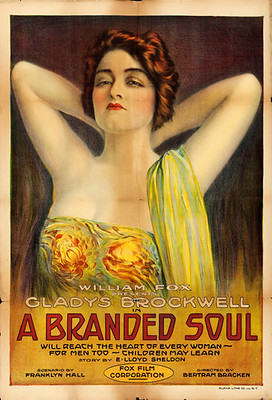 In the 1880s he was active as a sketch writer and actor in vaudeville. He parlayed this into ad writing and self-promotion by marketing himself and publishing instructional booklets in sketch writing, ventriloquism, and bookkeeping. He had a brief marriage in the 1890s and I believe he was the father of the actress Gladys Brockwell (1894-1929) who tragically died in Hollywood after a car accident. Gladys Brockwell had made the leap from silent film to talkies and was well-regarded – known as
In the 1880s he was active as a sketch writer and actor in vaudeville. He parlayed this into ad writing and self-promotion by marketing himself and publishing instructional booklets in sketch writing, ventriloquism, and bookkeeping. He had a brief marriage in the 1890s and I believe he was the father of the actress Gladys Brockwell (1894-1929) who tragically died in Hollywood after a car accident. Gladys Brockwell had made the leap from silent film to talkies and was well-regarded – known as The Woman of a Thousand Expressions.
In a neat twist - oddly enough Gladys Brockwell's online biographies list her father as H.R. Lindeman.
But I feel confident this is an error as her death certificate lists Minert Lindeman
as her father. The death certificate also indicates that she was born in Brooklyn.
Minert Lindeman's ex-wife also became an actress and took on the Brockwell surname. Billie
Brockwell (Lillian Voltaire (Smith?) Lindeman, 1875-1949) was said to have entered the industry as a vaudeville chorus girl. I believe I have uncovered a little more to her story that does not fit with the known biographical record, but that's probably too much to get into here!
I cannot say exactly how Minert H. Lindeman accumulated 275 One Cent U.S. Copper coins.
However, since he had an interest in bookkeeping and accounting, perhaps he was also mildly interested in coin collecting?
I sent my research to Pete Smith for comment, and he observed that A group of 275 large cents with various dates and various states of preservation is more likely to be an accumulation rather than a collection. An accumulation of large cents in 1908 has little numismatic significance.
M.H. Linderman letter on the NNP: https://archive.org/details/ansearlycorrespo00amer_46/page/150/mode/1up?q=various+date
Image: "A sultry portrait of leading lady Gladys Brockwell dominates this lovely stone litho image from the silent drama A Branded Soul."
To read the complete lot description, see:
A Branded Soul (Fox, 1917). Folded, Fine. One Sheet (28" X 41").. ...
(https://movieposters.ha.com/itm/drama/a-branded-soul-fox-1917-folded-fine-one-sheet-28-x-41-/a/7191-86750.s)
For more information, see:
https://en.wikipedia.org/wiki/Gladys_Brockwell
https://en.wikipedia.org/wiki/Billie_Brockwell
To read the earlier E-Sylum article, see:
NNP: LINDERMAN COLLECTION REMNANTS?
(https://www.coinbooks.org/v25/esylum_v25n22a08.html)
THOUGHTS ON IRIDESCENCE
Daryl Haynor submitted these thoughts and definitions about the term iridescence in numismatics. Thanks! -Editor
Mr. Webster defines iridescence as a lustrous rainbowlike play of color caused by
differential refraction of light waves that tends to change as the angle of view
changes.
In the coin realm, the words iridescence
and iridescent
used to
describe a coin's appearance are almost always accompanied by the words
toning
, colors
, hues, rainbow
, multicolored
, blues
, greens
,
purples
, splashes of golden apricot pumpkin orange tangerine
, {pick a
color}
.
The vocabulary term recited in last week's E-Sylum states that iridescence of numismatic items is due to a diffraction of light from flow marks, and that it is a form of mint luster. If that indeed were the case, toning enthusiasts would be searching freshly produced coins directly from the mint for rainbow beauties. Of course, that is not the case. While flow lines help to create the appearance of luster, even the highly desirable cartwheel effect, it is not flow lines, but another phenomenon that is the usual cause of iridescence on a coin.
Rather than using soap bubbles or nacre as an analogy, as the vocabulary term does, conjuring an oil spill on a flat-water surface creates a better image in one's mind of how colors may appear on a coin's surface (bubbles and pearls are round, yet water (a coin) is flat).
The thinnest layer of oil atop water can result in an eye-full of rainbow colors. How does this happen?
While some light waves bounce off the top surfaces of the oil, other light waves are redirected as they pass from one medium to another (refraction), and bounce off the coin surface below. The upper layer of oil creates one surface, while the water level creates a second and lower surface. The combination of bounced light off the oil, and refracted light bounced off the water level converge on the human eye to create colors via what is known as thin-film interference.
Thin-film interference is a natural phenomenon in which light waves reflected by the upper and lower boundaries of a thin film interfere with one another, either enhancing or reducing the reflected light.
Think of the water level as the coin's surface, and the oil level equivalent to toning, or the level of interaction of a coin's surface with its environment over time (patina). As the nature, length, and depth of the environmental interaction changes, so does the level of thin film interference, thus altering the colors that the human eye perceives on a coin's surface.
Iridescence does not necessarily disappear rapidly due to tarnish, as the vocabulary term states. It is actually created from, and may actually be enhanced as the level of toning advances (you say tarnish, I say toning). Of course, as patina (toning) advances on a coin, colors may become less eye appealing or cancel out altogether. Not all toning is attractive, as Mother Nature can be very fickle and she will do what she pleases.
Not to complicate matters, but it is actually a misnomer to refer to toning on a
coin as rainbow
toned. Although a rainbow is created by refraction, as is thin-
film interference to a degree, they are not the same thing.
The vocabulary term for iridescence conflates how the human eye sees mint (cartwheel) luster with how it sees toning on a coin. Hopefully this helps to separate the concepts of luster and toning.
To read the earlier E-Sylum article, see:
VOCABULARY TERM: IRIDESCENCE
(https://www.coinbooks.org/v25/esylum_v25n23a15.html)
VOCABULARY TERM: JANVIER PANTOGRAPH
Here's another entry from Dick Johnson's Encyclopedia of Coin and Medal Terminology. -Editor
Janvier Pantograph. A die-cutting machine, one of the most exacting and precise for reducing three-dimensional bas-relief designs while simultaneously cutting a die. The mechanical engraver is named after its developer, Victor Janvier (1852-1911), who did much to improve existing die-engraving machines, most notably the Contamin. He operated two separate businesses. One, Duval & Janvier, with sculptor Paul Marie Duval, did custom reductions, die-cutting and medal making (Janvier was an accomplished medalist himself since 1892). The other was Ateliers Victor Janvier, which constructed and sold reducing machines. After his death in 1911, the later firm became Janvier, Berchot & Cie.
anvier's basic reducing machine was patented in 1899. In addition to two models of bas-relief reducing machines, the firm also crafted one for the reductions of small statues and sculpture in-the-round. Hundreds of Janvier's machines were sold throughout the world, primarily to coinage mints, medal makers, and tableware manufacturers. The name Janvier virtually became generic for these die-cutting machines.
Janvier's machines were so exacting and precise that an entire design – lettering, design and border elements– could be accomplished all at once (eliminating the need for reduction punches and lettering punched in the die separately). This accomplished a desired capability of the die-engraving pantograph that Matthew Boulton had conceived a century earlier (1797).
Both the Paris Mint and the London Mint obtained Janvier machines (1905). The Paris Mint had started a project to improve their die-engraving pantographs (1900), but after acquiring the Janvier they adopted for their own pantographs many of the innovations that Janvier had introduced. Even so they did not complete this project until 1927.
The usefulness of the Janvier was so extensive, however, it was widely employed even in the manufacture of small decorative objects other than coins and medals. In addition to table utensils this included: buttons, badges, emblems, jewelry and small machine parts.
The first Janvier was imported (1902) in the United States for what was to become the Medallic Art Company. The Philadelphia Mint purchased their first Janvier (1906), and Gorham & Company had four Janvier pantographs in their tableware design department in Providence by 1915. By the First World War over 20 Janvier pantographs had been sold in the United States alone, and, by 1921, 140 sold worldwide. See pantograph.
To read the complete entry on the Newman Numismatic Portal, see:
Janvier Pantograph
(https://nnp.wustl.edu/library/dictionarydetail/516177)
AUGUSTUS SAINT-GAUDENS (1848-1907)
American Numismatic Biographies author Pete Smith submitted this article on Augustus Saint-Gaudens. Thanks! -Editor
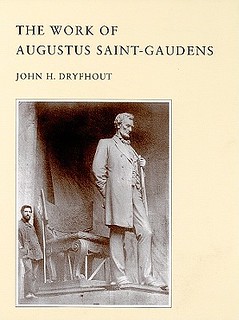 It should surprise no one that I collect numismatic literature. I also have about four feet of shelf
space devoted to art books. One cross-over item is The Work of Augustus Saint-Gaudens by John
H. Dryhout. My research will start there.
It should surprise no one that I collect numismatic literature. I also have about four feet of shelf
space devoted to art books. One cross-over item is The Work of Augustus Saint-Gaudens by John
H. Dryhout. My research will start there.
Augustus Saint-Gaudens was born on March 1, 1848, in Dublin, Ireland. His father was Bernard Paul Ernest Saint-Gaudens who was a French shoemaker. His mother was Mary McGuiness, an Irish co-worker in the shoe factory. Their last name comes from the town of Saint-Gaudens in southern France (next to Aspet) and the town was named for a Christian martyr.
The family came to Boston and settled in New York City when Augustus was six months old. In 1861 he was apprenticed to a cameo cutter. He left his apprenticeship in 1864 and began work with cameo cutter Jules Le Brethon. While working there he took drawing classes at Cooper Union and evening classes at the National Academy of Design.
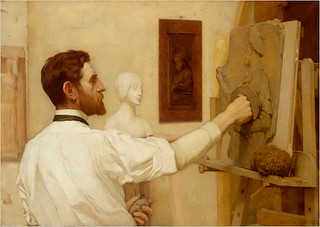 In 1867 he went to Paris to attend Ecole gratuite de Desin. Then in 1868 he was at the atelier
(workshop) of Francois Jouffroy of Ecole des Beaux-Arts. He continued to work and study in
France and Italy until 1872 when he returned to New York.
In 1867 he went to Paris to attend Ecole gratuite de Desin. Then in 1868 he was at the atelier
(workshop) of Francois Jouffroy of Ecole des Beaux-Arts. He continued to work and study in
France and Italy until 1872 when he returned to New York.
In 1870 he cut a cameo for Elmire (Almira) C. Whittlesey and did a pencil sketch of her nine - year-old daughter Fanny Smith Whittlesey. Those names would have made no impression a week ago until I wrote about Sarah Victoria Whittlesey Pratt, Mother of Bela Lyon Pratt. Their common ancestor goes back about six generations.
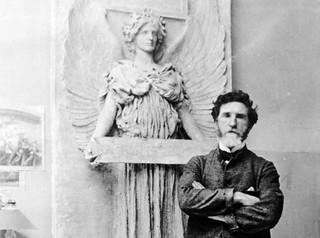 His first commissioned monumental sculpture was Hiawatha, sculpted in clay in 1871. It was
intended for exhibition in New York Central Park but never placed there. It passed through
several private collections.
His first commissioned monumental sculpture was Hiawatha, sculpted in clay in 1871. It was
intended for exhibition in New York Central Park but never placed there. It passed through
several private collections.
Back in Rome in 1873 he sculpted a number of busts. In December of 1873 he met Augusta Fisher Homer, a deaf student from Boston. They were engaged on April 15, 1874, and were married at Roxbury, Massachusetts, on June 4, 1877. Their only son, Homer, was born in Boston on September 29, 1880. He was memorialized with an 1882 bronze relief.
He produced the model for Silence
in 1874. It was carved in marble and placed at the Masonic
Grand Lodge of New York. It has been moved to the Masonic Soldiers and Sailors Hospital at
Utica, New York.
He returned to New York in 1875 to work for Tiffany Studios. In 1877 he did the model for his first major public commission, the Farragut Memorial in Madison Square Park in New York. In 1884 he began work on the Abraham Lincoln Monument for Lincoln Park in Chicago.
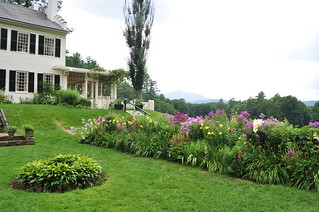 In 1885, the family began to spend summers at Cornish, New Hampshire, at their house called
Aspet. Studios were built there and an artist colony expanded in the area. It became his year-around home about 1900.
In 1885, the family began to spend summers at Cornish, New Hampshire, at their house called
Aspet. Studios were built there and an artist colony expanded in the area. It became his year-around home about 1900.
In 1886 he produced a marble head of Diana as a study for an intended larger statue. The model was Davida Johnson Clark. She is a bit of a mystery.
Albertina Hultgren was born in Sweden and came to America in 1879 at age seventeen to work as a model. She may have met Saint-Gaudens in 1880. It is believed she became his mistress in 1884. By 1885 she was transformed somehow to Davida Johnson and later Davida Johnson Clark. Davida had an androgenous beauty and may have been named for Michelangelo's David. Another possibility is the 1878 David by Antonin Mercie.
In June of 1889, Davida gave birth to a son, Louis P. Clark, fathered by Augustus Saint-Gaudens. In 1892, Saint-Gaudens executed a bronze relief study of a child named Novy.
This
was a nickname for his son Louis.
The neo-classical works gave way to the Beaux-Arts style, a period generally between the American Centennial of 1876 and the First World War. Saint-Gaudens had studied under Jouffroy in Paris and was one of the early practitioners of the style in America. In his workshops and as an instructor at the Arts Students League, he influenced a generation of artists including some like Bela Lyon Pratt who worked in his studio. Oher coin designers who worked under Saint-Gaudens include John Flanagan, James Earl Fraser and Adolph Weinman.
For the 1889 centennial of the George Washington Inauguration, Saint-Gaudens designed a medal commissioned by the Committee on Commemoration. His assistant, Philip Martiny modeled the relief and Saint-Gaudens held the copyright. This was Saint-Gaudens first commercial medal and was an influence on others in the Beaux-Arts style. The medals were not struck but rather cast by Gorham Manufacturing Company with 2000 in bronze and 10 in silver.
Saint-Gaudens modelled the obverse for the World's Columbian Exposition Commemorative Presentation medal for 1893. His reverse design, including a standing eagle, was not used.
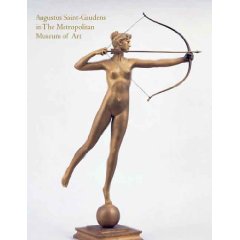 One of his best-known works was the 1892 weathervane Diana for the roof of Madison Square
Garden. It went through a few revisions and is known by later reductions and recasts. It is
believed that the model was Davida.
One of his best-known works was the 1892 weathervane Diana for the roof of Madison Square
Garden. It went through a few revisions and is known by later reductions and recasts. It is
believed that the model was Davida.
At about the same time he was doing the gilt bronze Sherman Monument in New York's Central Park. It features William Tecumseh Sherman on horseback. Leading the horse is a Winged Victory with outstretched arm. It is believed that Davida was the model for that figure. She took on a life of her own and appeared later on the $20 gold coin. Hettie Anderson was the model for the head.
A devastating 1904 fire at his studio in Cornish, New Hampshire, destroyed finished sculptures plus archival sketches, drawings and plaster models.
Saint-Gaudens designed the 1905 Theodore Roosevelt Special Inaugural Medal in gold. It was modelled by Adolph Weinman. The reverse shows a Ptolemaic standing eagle, previously seen on Saint-Gaudens rejected reverse for the Columbian Exposition Medal.
Roosevelt requested that Saint-Gaudens produce dies for new bronze one cent, $10 and $20 gold coins. The cent was never issued. The $10 gold eagle has an obverse head of Liberty wearing a feathered bonnet. The reverse had a Ptolemaic eagle similar to the eagle on the rejected reverse for the Columbian Exposition medal. Saint-Gaudens had used a similar eagle on his Shaw Memorial and on the gold Roosevelt Inaugural medal. Shaw may be remembered from the 1989 movie Glory.
An early design for the $20 gold coin (.900 gold) was a winged Victory similar to the Sherman Monument. She lost her wings before being struck in ultra-high relief as coins that would not stack. These were only produced in MCMVII. A lower relief version was used between 1907 and 1933. The coin is thought by many to be the most beautiful American Coin. If you own the 1933 double eagle, you may also consider it the most valuable U. S. Coin. (I have seen a dozen of them.)
Liberty on the double eagle is somewhat similar to Winged Victory on the Sherman Monument. If Davida was the model for the Sherman Monument, she may have also been the model for the body on the double eagle. It is now believed the model for the head was Hettie Anderson.
Augustus Saint-Gaudens was diagnosed with cancer in 1900 and his health and productivity gradually declined. He died on August 3, 1907, and was cremated. His ashes are at the Saint-Gaudens Memorial at Cornish, New Hampshire. His home and studio are now in Saint-Gaudens National Historic Park maintained by the National Park Service.
In the 1910 Census, Davida J. Clark was living with her 20-year-old son, Louis P. Clark. The death of Davida Johnson Clark was recorded on September 15, 1910, with her date of birth listed as December 30, 1861. She is buried at Spring Grove Cemetery in Darian, Connecticut. Also buried there is her mother, Maria Louisa Johnson. How Albertina Hultgren became the daughter of Maria Louis Johnson is a mystery I have not solved.
With little actual known biography, her life was fictionalized by Karen Ingalls as Davida: Model and Mistress of Augustus Saint-Gaudens published in 2016. Ingalls was a great-granddaughter of Clark.
The general design from the Saint-Gaudens double eagle was resurrected for the American Gold Eagle bullion coins introduced in MCMLXXXVI. (That's 1986 for those who don't speak Roman.)
In 2009 the Mint copied the design for a 24 kt gold coin described as ultra-high relief. The piece is a tribute to the original Saint-Gaudens design. Perhaps an equally artistic tribute could be made with chocolate wrapped in gold foil.
HARVEY STACK'S NUMISMATIC FAMILY, PART 123
Stack's Bowers has a backlog of the late Harvey Stack's numismatic memoir articles and will continue publishing them. In this one Harvey discusses a late 1990s transitional point in numismatics, when grading services became mainstream and collectors adapted (or didn't) to the new world of slabs, all while old-time collections were coming to market. -Editor
While Harvey Stack passed away in January of this year, we are pleased to continue to offer readers the articles he had already written, so that they can be read and enjoyed as he would have wished.?
In the last quarter of 1996 and going into 1997 numismatics showed signs of new interest and regrowth. As grading and authenticating services became more prominent, buyers had more confidence in their purchases, and a lot of unscrupulous sellers were taken out of the market. Of course not everyone liked slabs as it made some of the traditional ways of collecting – using paper envelopes or coin albums – very hard to continue. If you had a collection you were building in an album or large lucite holder, these collecting methods made it very clear what items you were still looking for and what was needed. The grading companies tried various sizes of holders and different ways of labeling them, but the fact that coins were increasingly slabbed meant that people had to choose between security and sticking with their "old ways." For many the assurance of having authenticated and graded coins was worth it. Others were emotionally attached to the way they had dealt with coins in the past. They liked holding them by their edges, feeling the weight and size of each item, examining them close up for blemishes, light bag marks and striking quality. They could have the coin in their hands and try to imagine its history and who owned it before. We always felt that whatever pleased each individual collector was what they should do.
In general, collectors were coming back to the field. We witnessed greater traffic in our shop to view and purchase our inventory, better attendance, and greater numbers of mail bids at our auctions. We also saw a great increase in the number of people taking part in national and local shows around the country, and an increase in memberships at local coin club meetings. Even the size of coin publications grew with more stories and advertisers. It is also interesting to note that even as late as 1997 people were still examining their daily change to see if they could find any silver coins issued in the United States before 1965 as the value of silver had risen so much that a tidy profit for the finder was possible.
Scarce and rare dates began to rise again in the marketplace, as auction sales had greater participation and contributed to stronger prices. A number of old time collectors felt the market was stronger than it had been during the few preceding years and decided to consign their items to a Stack's public auction. In 1997 we had enough collections to conduct ten separate sale which offered various rarities and quality collections formed by some well known numismatists, some of whom we had served for decades. In many cases new records were established.
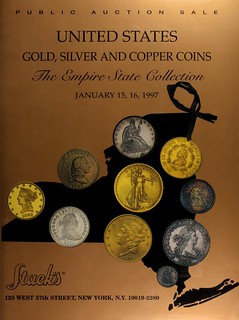 In January we started the year with a real old-time cabinet, The Empire Collection of United States Gold, Silver and Copper Coins. It had been assembled by a collector who had started the hobby in his youth in the 1920s working with his father and grandfather to collect initially from daily change. It was a time when one could find both 19th and 20th century coins of various denominations, even an occasional gold coin. It was not surprising to find Indian cents, Liberty nickels, Barber dimes, quarters, and half dollars and even an occasional silver dollar in one's pocket at the end of the day. As the "Empire" collector grew older and started to improve his holdings he was able to buy mostly Mint State and Proof coins and acquire many outstanding rarities. He decided to start with building a type set of all denominations in all metals and expanded it to include important varieties and mintmarks. The sale of his collection featured 1,457 lots and was a great way for us to start our 1997 season. It was decided not to use his actual name as his family was well known in Wall Street and his grandfather was a candidate for political office. But this was not out of the ordinary, as many collectors wanted to use a pseudonym, some for similar reasons to this client, some just because they were modest.
In January we started the year with a real old-time cabinet, The Empire Collection of United States Gold, Silver and Copper Coins. It had been assembled by a collector who had started the hobby in his youth in the 1920s working with his father and grandfather to collect initially from daily change. It was a time when one could find both 19th and 20th century coins of various denominations, even an occasional gold coin. It was not surprising to find Indian cents, Liberty nickels, Barber dimes, quarters, and half dollars and even an occasional silver dollar in one's pocket at the end of the day. As the "Empire" collector grew older and started to improve his holdings he was able to buy mostly Mint State and Proof coins and acquire many outstanding rarities. He decided to start with building a type set of all denominations in all metals and expanded it to include important varieties and mintmarks. The sale of his collection featured 1,457 lots and was a great way for us to start our 1997 season. It was decided not to use his actual name as his family was well known in Wall Street and his grandfather was a candidate for political office. But this was not out of the ordinary, as many collectors wanted to use a pseudonym, some for similar reasons to this client, some just because they were modest.
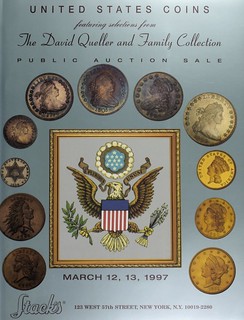 In March we brought to auction the famous David Queller Family Collection, a sale of 1,876 lots. David, an industrial merchant for machine parts and tools, had a shop and warehouse near Canal Street in New York City. In 1954 he wanted to get his son Howard interested in a hobby. A close friend, who had a supply business near him on Canal Street suggested to David to get his son, and even his wife and daughter, sorting coins they got from change. He also recommended Stack's as the place for items they couldn't find in daily change. On one of his early visits, David saw some modern Proof and Mint sets in the Stack's window and learned about the sets he could acquire. We gave him a Red Book and he went home to study it and show it to his family. He was amazed how many different denominations the U.S. Mint struck since 1792 and the varieties and date and mintmarks that could make up sets.
In March we brought to auction the famous David Queller Family Collection, a sale of 1,876 lots. David, an industrial merchant for machine parts and tools, had a shop and warehouse near Canal Street in New York City. In 1954 he wanted to get his son Howard interested in a hobby. A close friend, who had a supply business near him on Canal Street suggested to David to get his son, and even his wife and daughter, sorting coins they got from change. He also recommended Stack's as the place for items they couldn't find in daily change. On one of his early visits, David saw some modern Proof and Mint sets in the Stack's window and learned about the sets he could acquire. We gave him a Red Book and he went home to study it and show it to his family. He was amazed how many different denominations the U.S. Mint struck since 1792 and the varieties and date and mintmarks that could make up sets.
David decided to start a collection, but only wanted Mint State or Proof coins, the best he could get. In the same year, 1954, David visited Stack's again and decided at that one sitting to buy sets of two-cent pieces, three-cent pieces (silver and nickel), Shield and Liberty nickels, 20-cent pieces, Peace dollars, and silver and gold commemoratives. He also bought some individual coins to fill in the family's collections they had built from change. In this way David immediately became a valued collector. He took pride in acquiring a basic collection as a great starter. In later years later he could be seen at various coin shows and conventions around the country, and he was often found at Stack's to see what was new.
Our January and March 1997 sales were a strong way to begin our year, but there was much more to come in 1997, as I will tell in my next article.
To read the complete article, see:
Growing up in a Numismatic Family: Part 123
(https://www.stacksbowers.com/News/Pages/Blogs.aspx?ArticleID=harvey-stack-remembers-123)
To read the earlier E-Sylum article, see:
HARVEY STACK'S NUMISMATIC FAMILY, PART 122
(https://www.coinbooks.org/v25/esylum_v25n22a18.html)
MAKING THE REALLY BIG MONEY EXHIBIT
Jennifer Gloede and Laura McClure of the National Numismatic Collection published a blog article about the Smithsonian's new exhibition "Really BIG Money". Here's an excerpt. Check out the time-lapse video! -Editor
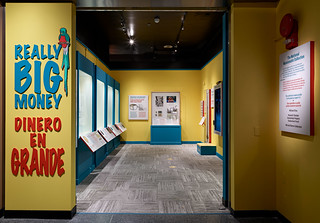 While installing a new exhibition called Really BIG Money, we—collections manager Jennifer and mount maker Laura—faced a number of challenges, mainly mounting really big objects. One of the trickiest tasks we faced was mounting 165 coins together to form a gigantic Roman coin, complete with the head of a Roman emperor.
While installing a new exhibition called Really BIG Money, we—collections manager Jennifer and mount maker Laura—faced a number of challenges, mainly mounting really big objects. One of the trickiest tasks we faced was mounting 165 coins together to form a gigantic Roman coin, complete with the head of a Roman emperor.
Before we dive into that challenge, here's the context: Really BIG Money is a new exhibition featuring monetary objects from the National Numismatic Collection that was written and designed with elementary-aged visitors in mind. Collections managers and mount makers are a key part of bringing exhibitions like this one to life. Collections managers care for the objects in a variety of ways, including cataloging and safely handling them. Mount makers create the structures that safely hold objects while they are on display. Creating a giant coin out of coins requires both of these skill sets—and a lot of patience.
With that covered, let's get back to these 165 Roman coins and what they have to do with being really big. The coins we worked with were selected by the exhibition's curators to represent money that is big
in quantity, rather than size or denomination. These coins are just a portion of a hoard of 563 coins from ancient Rome. Roman emperors were some of the first people to put their faces on coins; it was an important tool to show people who was in power. To engage young visitors, the exhibition team decided to display the coins in an innovative way, arranging them so they formed one—you guessed it!—really big coin. We were excited to take on this challenge, knowing that we would need to spend hours preparing, carefully maintaining accurate records, and safely handling and mounting the objects.
These three coins illustrate some of the shared features of the coins in the display—a central portrait surrounded by text, beaded border, and similar color—but they also have unique details. (NU.81.53.0768, NU.81.53.0322, and NU.81.53.0351)
The coins in this group represent 10 different rulers and are roughly 1,700 years old. Many of them look similar, but each coin is unique because they were hand struck and have experienced varying amounts of wear over time. The coins are not physically marked with a museum catalog number, but they each have a number that is recorded on their storage box and in the museum's database. Making sure that these catalog numbers remained linked to the correct coins was one of our most important jobs. To an expert in coins and medals, it might be simple to read the text on the coins, find the mint mark, and distinguish these very similar coins from each other. However, in our process of mounting and tracking, we had to think carefully about the deinstallation process. We had to assume that someone with no numismatic experience could be the person who takes these objects off display and puts them back into storage. It may be unlikely that that would happen, but it is crucial to make the process as simple as possible and not rely on numismatic expertise. Just in case!
To prepare for this project, Jennifer cataloged each coin in the museum's database, carefully noting its weight, diameter, thickness, place made (mint), and ruler depicted. She also photographed each object to capture its unique details. At the same time, Laura began the time-consuming process of making pin mounts with two pliers and a miniature belt sander.
The panel that the coins would be mounted on was prepared as well. The exhibition designer created an outline based on an actual coin, which was then printed on fabric. The fabric was carefully wrapped over a layer of Ethafoam and Medex to create a stable base on which to pin the coins. Finally we printed a full-size image of the outline to use as a map of the objects.
As Laura took a coin, one at a time, and pinned it to the board, Jennifer recorded the placement of the coin and the catalog number. We created a color-coded system where each ruler was a different color so it could be easily found on the map and then on the board itself. Laura began to mount the coins in the center of the silhouette of the coin head, drawing on her past experience with mosaic tile work! She mounted each coin with three pin mounts to secure it to the fabric-wrapped substrate. When the silhouette was completed, she began to add coins around the perimeter.
We completed mounting these objects in about one and a half days. The hours we had spent preparing saved us time during the mounting process. Teamwork and constant communication were important to the success of the project. Here is the final product!
We're excited to welcome visitors to the museum to see these and the many other objects in Really BIG Money!
To read the complete article, see:
2 experts, 165 coins, 1 really big head
(https://americanhistory.si.edu/blog/2-experts-165-coins)
To read the earlier E-Sylum article, see:
https://www.coinbooks.org/v25/esylum_v25n15a11.html
(https://www.coinbooks.org/v25/esylum_v25n15a11.html)
THE ECONOMY MUSEUM AT THE ST. LOUIS FED
The St. Louis Post-Dispatch published a nice article about the reopening of the museum at the St. Louis Federal Reserve. -Editor
Most St. Louis attractions — especially the free ones — give visitors lots of bang for their buck. The latest free museum to reopen, the Economy Museum at the St. Louis Fed downtown, gives visitors bang and actual bucks.
Well, sort of.
The Federal Reserve is in the business of shredding money when its time is up in circulation. So when visitors leave, they get a small bag of shredded cash as a souvenir.
The world's hardest puzzle,
quips museum director Tom Shepherd, who is glad to see visitors stream through the doors again since the museum closed to the public in March 2020. It reopened this spring with an additional 1,400-square-foot currency-themed space called the Vault. The entire museum is now 7,000 square feet.
Visitors can also explore the art of cash, marveling over some of the largest-denomination notes ever printed (a $1 trillion note for your spending pleasure in Zimbabwe, anyone?), as well as colorful bills featuring exotic birds, see-through panels and vertically oriented designs.
You can learn about the security features of American bills, see if you can spot counterfeit ones, see old and rare currencies made of porcelain and glass, and spin the Journey of Money wheel, where you can learn how money flows through the economy.
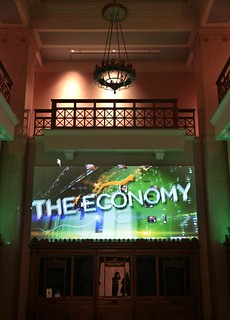 The Economy Museum at the St. Louis Fed opened in 2014. Nine of the 12 Federal Reserve banks nationwide operate some sort of museum, and they're all a little different, says Shepherd.
The Economy Museum at the St. Louis Fed opened in 2014. Nine of the 12 Federal Reserve banks nationwide operate some sort of museum, and they're all a little different, says Shepherd.
Thankfully, the new exhibit had been in the planning stages when the museum closed for the pandemic. During the closure, Shepherd worked to put many of the exhibits online for teachers to use in classrooms. He hopes to see more school groups in the fall and is ready to greet summer crowds.
The museum is integrated into the historic 1925-era bank lobby, with historic photos displayed behind ornate brass cashier gates. Visitors watch a short movie projected high above them about the seven-state region served by the Eighth Federal Reserve District.
... about two weeks after the museum opened in 2014, Shepherd heard yelling inside. He ran in to see a group of students from Lindenwood University having a blast
playing in the interactive trading pit, where buyers and sellers see who can make the most money in a timed round.
And I was just like: ‘Huh. It worked. Cool.' It was nice to see they were having fun like that.
For people when they walk in here, this is not how they expect the Federal Reserve is going to look,
Shepherd says. That's kind of what we're going for. One of the best compliments we get, especially from high school students, is the phrase, ‘that's a lot cooler than I thought it was going to be.' I love that.
Found via News & Notes from the Society of Paper Money Collectors (Volume VII, Number 49, May 24, 2022). -Editor
To read the complete article, see:
Expanded money museum at St. Louis Fed reopens with more bang for the buck
(https://www.stltoday.com/entertainment/expanded-money-museum-at-st-louis-fed-reopens-with-more-bang-for-the-buck/article_975d18a7-053f-59f9-ac38-783423268cd5.html)
For more information, see:
https://museum.stlouisfed.org/
THE MONEY MUSEUM AT THE CHICAGO FED
Not to be outdone, the Chicago Fed has a museum as well. Unfortunately, their website says it's temporarily closed. -Editor
The Money Museum at the Federal Reserve Bank of Chicago is a great way to spend a morning or an afternoon for a no-cost learning adventure. It's located inside the Chicago Federal Reserve Bank which is one of a dozen federal reserve banks serving our nation.
Inside, you'll find dozens of exhibits about United States currency. You can view this display of one million dollars in $20 bills.
You can see money that isn't printed anymore, like this $5000 bill with James Madison on it. These haven't been printed since 1945.
You can also check out this cube of one million dollars in one dollar bills.
The Money Museum at the Chicago Federal Reserve Bank is a quick but enjoyable stop. When you depart, you will have learned some interesting facts and you will have some fun pictures to share with your friends. And, you'll probably think a bit more about the bills and change in your wallet next time you pay for a snack, too.
Address: Federal Reserve Bank of Chicago, 230 S LaSalle St, Chicago, IL 60604, USA
Inside, you'll find dozens of exhibits about United States currency. You can view this display of one million dollars in $20 bills.
To read the complete article, see:
Illinois Has An Entire Museum Dedicated To Money And It's As Awesome As You'd Think
(https://www.onlyinyourstate.com/illinois/money-museum-chicago-il/)
To visit the museum's website, see:
Chicago Fed's Money Museum
(https://www.chicagofed.org/education/money-museum/index)
ARCHIVES INTERNATIONAL AUCTION 77
Here is the announcement for the June 15, 2022 sale by Archives International Auctions. -Editor
ARCHIVES INTERNATIONAL AUCTIONS OFFERS HISTORIC U.S., CHINESE & WORLD BANKNOTES, COINS & SCRIPOPHILY COLLECTION ON JUNE 15, 2022
The auction will be held by Archives International Auctions at their offices in River Edge, N.J.
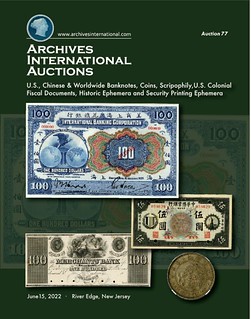 The June 15, 2022, Auction 77, by Archives International Auctions will
feature of 662 lots of rare and desirable U.S., Chinese & World Banknotes, Coins, Scripophily,
Historic Financial Ephemera, and Security Printing Ephemera. The auction is highlighted by 144
lots of Chinese banknotes, a majority of the notes being from an old-time collection having
never been offered previously at auction. We will also be offering 39 lots of World coins
including examples from Austria, Canada, German States and Empire, Puerto Rico and Japan
with many scarce and high-grade examples, with most NGC graded. Also included are an
additional 184 Worldwide banknotes with many rarities present; 65 lots of U.S. Colonial
banknotes and fiscal documents, U.S. Obsolete banknotes, depression scrip, Confederate
banknotes and related items; 70 lots of Historic Ephemera and Security Printing Ephemera with
additional lots of checks drafts and exchanges; 15 lots of Philatelic Souvenir Cards by ABNC,
world stamps and postal history; and, ending with 84 lots of U.S. and World Scripophily.
The June 15, 2022, Auction 77, by Archives International Auctions will
feature of 662 lots of rare and desirable U.S., Chinese & World Banknotes, Coins, Scripophily,
Historic Financial Ephemera, and Security Printing Ephemera. The auction is highlighted by 144
lots of Chinese banknotes, a majority of the notes being from an old-time collection having
never been offered previously at auction. We will also be offering 39 lots of World coins
including examples from Austria, Canada, German States and Empire, Puerto Rico and Japan
with many scarce and high-grade examples, with most NGC graded. Also included are an
additional 184 Worldwide banknotes with many rarities present; 65 lots of U.S. Colonial
banknotes and fiscal documents, U.S. Obsolete banknotes, depression scrip, Confederate
banknotes and related items; 70 lots of Historic Ephemera and Security Printing Ephemera with
additional lots of checks drafts and exchanges; 15 lots of Philatelic Souvenir Cards by ABNC,
world stamps and postal history; and, ending with 84 lots of U.S. and World Scripophily.
We are excited to offer an amazing assortment of China and Asia banknotes and coins as well
as a large assortment of U.S. and World banknotes and scripophily
, stated Dr. Robert
Schwartz, President of Archives International Auctions. Included in the upcoming auction are
rare and desirable numismatic items that will enhance the collections of every level of collector
and dealer
.
The auction begins with 382 lots of World banknotes highlighted by 2 amazing Chinese
banknotes, an International Banking Corporation, 1905, $100, P-S422s in PMG 65 EPQ and also
a Chinese-American Bank of Commerce, 1920, $5, Harbin
Issue Specimen Banknote Rarity;
Canada is highlighted by 2 extremely rare 1991, $20, Bank of Canada, DuraNote Polymer Essay
Banknote, one completely printed and the second as a progress proof, both PMG graded; an
amazing 1993 Bank of England, £10, DuraNote Essay Polymer Plastic Banknote Rarity that
was intentionally miscut so it could be released by the Bank and to cancel it; a Bank of
Israel, 1960 / 5720, 50 Lirot, Top Pop
and highest graded note from this series; a Banco de Venezuela, (1931-39), 100 Bolivares, Highest graded Specimen; and hundreds
of other notes that are sure to attract everyone from the beginning to advanced
collector.
World coins are represented by 39 lots highlighted by a Canada, 1937, King George VI Dollar that is NGC graded MS 64; 12 lots of Germany and German States silver coins that are raw and from and old time collection, being offered for the first time; 17 lots of Japanese coins highlighted by 2 different 1897, 1 Yen, M30, NGC graded MS 63 and MS 64; an 1896, 1 Yen M29, NGC graded AU Details, and numerous other early Japanese and World coins.
U.S. Colonial Fiscal documents include 11 historic Connecticut documents signed by various
revolutionary war notables such as Jedediah Huntington, Oliver Wolcott Jr. and others; U.S.
Obsolete banknotes are highlighted by an 1810-20 Delaware obsolete banknote proof from the
Bank of Wilmington & Brandywine that was a discovery note from the Silver City Collection
auction held by us in 2011, with 19 additional obsolete lots offered; U.S. Fractional Currency
includes 6 lots highlighted by a Third Issue, 3 Cents uncut block of 4 as well as additional high
grade issued and proof notes; Confederate banknotes are highlighted by an 1864, $500
banknote as well as high-grade $5 and $20 1864 Confederate issues; National Banknotes are
highlighted by a 1902, $5, Bank of Beverly Hills, Charter# 11461; U.S. Small Type notes are
highlighted by a $1, 1935A, WW II Emergency Hawaii Issue Replacement note and many other
interesting and desirable banknotes.
U.S. & World Historic Ephemera and Autographs include an 1850, San Francisco, California, I/U 2nd Bill of Exchange issued one month before California attained statehood; an 1863, Application of a Drafted Person finding and paying $300 for a substitute to take his place; an 1846 Alabama Estate Appraisal Document Listing Slaves and other property; and, numerous rare and fiscal items. Security Printing Ephemera includes 40 lots of various security printed production and advertising items highlighted by an 1817-22 Tanner, Kearny & Tiebout Proof Advertising Banknote from Philadelphia, Pennsylvania and one of the earliest Security Printed Advertising notes known. A wide variety of security printer items are included in this auction that cover every aspect of Intaglio printing offered by both U.S. and European printers that is sure to attract the attention of the advanced collector interested in the development and history of Security printing in the world.
Also included in the auction are 11 lots of American Bank Note Company Hawaiian Philatelic Souvenir cards from 1993 that are comprised of 6 different blocks of 4 of various Hawaiian stamps from that period that are intaglio printed and originally dated from 1887 to 1898. They are offered in groups of 5 or 10 sets of 6 different souvenir cards, all in superb condition as printed. The auction ends with 84 lots of U.S. & World Bonds and Shares include the topics of banking, railroads, mining, and additional subjects with many rare and desirable items offered.
Previews will be limited and by appointment only and we will be observing strict safety precautions including the wearing of masks and observing social distancing to protect our team as well as our guests. We will do our best to accommodate anyone who desires additional information and photographs. For questions, please call 201-944-4800 or email info@archivesinternational.com.
The online catalog for the Wednesday, June 15 th , 2022 auction is on Archives International Auctions' website and can be viewed via the Archives International live bidding platform. It can also be viewed as a Virtual Catalog or downloadable Sale 77.pdf on their website. To pre-register for Live Internet Bidding, log on to the Archives International Auctions website, at www.ArchivesInternational.com.
Archives International is now working on their Summer and Fall 2022 auctions and are seeking quality consignments for future auctions or outright purchase including U.S. and worldwide banknotes, coins, stocks, bonds, stamps, postal history, historic ephemera, and autographs. To sell or consign one piece or an entire collection, please call AIA at (201) 944-4800; or email them at info@archivesinternational.com
You may also write to Archives International Auctions, at 1060 Main Street, Suite 202, River Edge, NJ 07661, U.S.A. To learn more about Archives International Auctions and the auction planned for June 15 th , 2022 auction, log on to www.ArchivesInternational.com.
NUMISMATIC NUGGETS: JUNE 12, 2022
Here's a selection of interesting or unusual items I came across in the marketplace this week. Tell us what you think of some of these. -Editor
Clemente X 1670-1676
Piastra del Giubileo, 1675, Roma, AG 31.62 g.
Ref : MIR 1943/1 (R)
TB-TTB. Rare
From the June Editions Gadoury sale of Papal coins. Worn, but still an impressive piece. -Editor
To read the complete lot description, see:
Online Auction 36
Lot 315
(https://www.biddr.com/auctions/gadoury/browse?a=2574&l=2879000)
1761, Great Britain. IMITATION OF THE OFFICIAL CORONATION MEDAL OF CHARLOTTE. Unsigned (after Lorenz Natter). Bronze 33mm. Eimer 696, cf. BHM 66.
From the eBay offerings of Hedley Betts. -Editor
To read the complete lot description, see:
CONTEMPORARY IMITATION OF THE OFFICIAL CORONATION MEDAL of CHARLOTTE bronze 33mm
(https://www.ebay.com/itm/165493850792)
1967 NEBRASKA CENTENNIAL MEDAL 1.9 OZ 999 SILVER ROUND MEDALLIC ART (5135)
Certification: Uncertified
Composition: Silver
Year: 1967
A nice medal. I don't see any designer's initials on it. -Editor
To read the complete lot description, see:
1967 NEBRASKA CENTENNIAL MEDAL 1.9 OZ 999 SILVER ROUND MEDALLIC ART (5135)
(https://www.liveauctioneers.com/item/130663626_1967-nebraska-centennial-medal-19-oz-999-silver-round-medallic-art-5135)
2008 Gilt China 40mm Silver Medal - NGC PF68 UCAM - Beijing Banknote
Certification: NGC
Grade: PF68 Ultra Cameo
Certification Number: 4906112-003
Composition: Silver
Year: 2008
In the numismatics-about-numismatics department is this colorized 2008 silver medal depicting the Beijing Banknote Printing Plant. Nicely done, I think. -Editor
To read the complete lot description, see:
2008 Gilt China 40mm Silver Medal - NGC PF68 UCAM - Beijing Banknote
(https://www.liveauctioneers.com/item/130669479_2008-gilt-china-40mm-silver-medal-ngc-pf68-ucam-beijing-banknote)
Cast Iron Flying Pig Still Bank
Condition
- rust and oxidation throughout; scuff marks and light residue.
Dimensions
13.0" W x 8.25" H x 7.0" D
In the when-pigs-fly-department is this delightful cast iron bank offered by a Kentucky dealer. -Editor
To read the complete lot description, see:
Cast Iron Flying Pig Still Bank
(https://www.ebth.com/items/13007397-cast-iron-flying-pig-still-bank)
This Dogecoin proudly showcase your successful joining of life-changing Blockchain revolution! Dogecoin allows everyone to realize their dream of owning virtual currency. Show off your physical cryptocurrency coins. The gold dogecoin coin will make a modern, elegant, stylish addition to the collection of every inspired investor in crypto currency mining!
Dogs more your thing? If physical bitcoins haven't yet come down enough in price for you, consider these goldplated Dogecoin "commemorative" coins. No actual digital currency included. -Editor
To read the complete item description, see:
Gold Dogecoin Commemorative Coin Gold Plated Doge Coin 2021 Limited Edition Collectible Coin with Protective Case (1oz)
(https://www.amazon.com/dp/B095HM8D4S)
During the Second World War, the Bank of England did away with all denominations above £5 in an attempt to thwart counterfeiters. It wasn't until 1964, when J Q Hollom was Chief Cashier, that the Bank reintroduced the £10 denomination into circulation. These new £10 notes followed the Portrait series with a youthful portrait of Queen Elizabeth II on the front with a lion trailing a ribbon in its mouth and holding a two-sided key in its paws on the back. This remained the highest denomination until 1970 and was issued under three different Chief Cashiers. We recently purchased a run of these first Portrait £10 notes with J Q Hollom's signature (B299) They have seen no circulation and grade Crisp Good Extremely Fine. Lovely examples of the first Portrait £10 note in GEF.
Going back to real money, here's a nice postwar Bank of England note found on the CoinCraft site. -Editor
To read the complete item description, see:
J Q Hollom Portrait £10 B299 GEF
(https://coincraft.com/j-q-hollom-portrait-10-b299-gef)
WAYNE'S NUMISMATIC DIARY JUNE 12, 2022
Chopmarked Twenty
Earlier this week I noticed that a $20 bill in my wallet had multiple chopmarks on it. I counted five altogether, Here are some closeups.
To read an earlier E-Sylum article, see:
CHOPMARKS ON MODERN U.S. PAPER MONEY
(https://www.coinbooks.org/esylum_v17n07a21.html)
The Whitman Expo
On Thursday June 9, 2022 I took an afternoon off work and headed up to Baltimore for the Whitman Expo. The summer show is smaller than the others, and I missed seeing a lot of regulars. But it was great fun and relaxing. PRO TIP: If you have some time and don't want to pay convention center prices for a soft drink, wander down to the Cheesecake Factory and order one at the bar. $1.59 plus tip with free refills. It was odd to be there without ordering food, but I was still full from lunch and used the time to catch up on email and news.
At the Whitman booth I took a few minutes to have a closer look at the Bob McCabe book on Counterfeiting and Technology. It's very nicely done and worth picking up for your library.
To read the earlier E-Sylum article, see:
BOOK REVIEW: COUNTERFEITING AND TECHNOLOGY
(https://www.coinbooks.org/v20/esylum_v20n07a03.html)
David Lisot
I also spent a good bit of time with David Lisot, and he took time to film an interview with me about my numismatic experiences and work with The E-Sylum and the Newman Numismatic Portal. Stay tuned for the published video.
Don Kagin and the World's Oldest Living Pioneer
In earlier issues I remarked on how it would be good for the hobby to have more reenactors at coin shows, such as the portrayers of Ben Franklin, Abe Lincoln and Gen. William T. Sherman at the recent PAN show in Pittsburgh. So I stopped by to see Don Kagin and ask, "When's the last time The Oldest Prospector came out?" Don's dress routine brings forth entertaining and educational "you are there" stories of private and pioneer gold coinages. He also has a "Colonial Man" routine to cover U.S. colonial coinages.
Fortunately, some of Don's performances have been captured in David Lisot videos. Follow the links to watch!
Here's Don at his table with David McCarthy, holding a $50 US Assay Office slug from the California gold rush.
Don as the World's Oldest Living Pioneer at a 1996 Long Beach show.
To watch Don's performances, see:
Kagin's Oldest Pioneer (2007)
(https://nnp.wustl.edu/library/book/578906)
World's Oldest Living Pioneer (1996)
(https://nnp.wustl.edu/library/book/560377)
Oldest Living Pioneer (2011)
(https://nnp.wustl.edu/library/book/544786)
Colonial Man (2010)
(https://nnp.wustl.edu/library/book/548786)
Gerry Fortin & Co.
Newman Numismatic Portal Project Coordinator Len Augsburger is also President of the Liberty Seated Collectors Club, and can often be found at the table of Liberty Seated specialist dealer Gerry Fortin. I passed by and stopped at the table a number of times during the afternoon.
I didn't partake, but at the end of the afternoon the crew relaxed with a round of "Baltimore Water".
Len Augsburger & the Newman Portal
Afterwards Len and I repaired to the nearby Morton's restaurant for a leisurely and tasty steak dinner. We covered a lot of ground in our conversation, including upcoming new content for NNP, a new intern and student staff, my photos from visits to the libraries of numismatic bibliophiles and dealers, and more - cabbages, kings, politics, and the world in general. Neither of us had room for dessert, but I paid out more than enough to the Baltimore restaurant scene to make up for my Cheapskate Factory visit.
Wrapping Up
It was about 9pm when I got back to my car and headed home to Northern Virginia. It had been a productive day. I met with E-Sylum supporters Wayne Herndon, Julian Leidman, Jeff and Mary Lynn Garrett, and Tom Caldwell and Chris Clements of Northeast Numismatics. I also had the chance to meet with a few potential new advertisers, and got some ideas for recruiting new E-Sylum readers from Andy Singer and David Lisot. I'm already looking forward to my next shows!
COINS OF JULIAN THE APOSTATE
In his CoinWeek Ancient Coin Series, Mike Markowitz recently discussed the coinage of Julian the Apostate. Here's an excerpt - see the complete article online for much more. -Editor
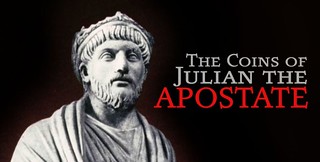 REMEMBERED AS THE
REMEMBERED AS THE Apostate
by his enemies, and the Philosopher
by his friends, Flavius Claudius Julianus–or Julian–ruled as Roman emperor from November 3, 361 CE until his death on June 26, 363. On the list of emperors, he is numbered as Julian II
, because a short-lived usurper, Julian of Pannonia, who briefly held power on the Danube frontier (c. 283-286), counts as Julian I
.
In the massacre of Constantine the Great's relatives that followed his death in 337, Julian's father and many of his kin were slain. Julian and his half-brother Gallus were spared only because of their young ages: Julian was five years old; Gallus was about 10. Our future emperor spent much of his youth under a kind of house arrest at a remote estate in Cappadocia in Anatolia (modern Turkey), closely monitored by agents of his cousin, the paranoid emperor Constantius II. Brought up by his tutors as an orthodox Christian, Julian received an excellent classical education.
Julian as Caesar
In November 355, faced with a shortage of trustworthy generals and an abundance of invading barbarians, Constantius promoted Julian to the rank of Caesar (in effect, Junior Emperor) and put him in charge of defending Gaul. Despite his lack of military and political experience, Julian proved to be a gifted commander and a competent administrator. Julian's coinage as Caesar shows him clean-shaven in accordance with the current fashion of Constantius's court. Beards were considered a Greek affectation.
Probably the most popular and famous coin of Julian–and one of the few coin types referenced in ancient literary sources–is the large bronze follis, or double maiorina
bearing the image of a bull on the reverse. Though ironically, numismatists don't know what the denomination was actually called, either by the people who issued it or the people who used it. Struck at most of the imperial mints, the coin weighs about 8.5 grams.
To read the complete article, see:
CoinWeek Ancient Coin Series: Julian the Apostate
(https://coinweek.com/ancient-coins/coinweek-ancient-coin-series-julian-the-apostate/)
COINS FROM POMPEII'S RUINS
An article in the journal Nature discusses the financial implications of coins found in the ruins of Pompeii. -Editor
When Mount Vesuvius erupted in AD 79, hundreds of people who had failed to flee the nearby city of Pompeii were killed by toxic gases and volcanic debris. Now, an analysis of ancient coins found with skeletons in Pompeii hints at the economic status of those who remained.
Found via The Explorator newsletter. To subscribe to Explorator, send a blank email message to: explorator+subscribe@groups.io. -Editor
To read the complete article (subscription required), see:
Coins from Pompeii's ruins hint at finances of the dead
(https://www.nature.com/articles/d41586-022-01542-0)
HUNGARY FIND OF NORWAY'S KING HARALD COIN
A metal detectorist in Hungary unearthed a tiny medieval silver coin. -Editor
A metal detectorist has discovered a small silver coin marked with the name of a famous Viking king. However, it was unearthed not in Scandinavia, but in southern Hungary, where it was lost almost 1,000 years ago.
The find has baffled archaeologists, who have struggled to explain how the coin might have ended up there — it's even possible that it arrived with the traveling court of a medieval Hungarian king.
The early Norwegian coin, denominated as a "penning," was not especially valuable at the time, even though it's made from silver, and was worth the equivalent of around $20 in today's money.
"This penning was equivalent to the denar used in Hungary at the time," Máté Varga, an archaeologist at the Rippl-Rónai Museum in the southern Hungarian city of Kaposvár and a doctoral student at Hungary's University of Szeged, told Live Science in an email. "It was not worth much — perhaps enough to feed a family for a day."
An 1865 engraving of the Harald Hardrada penning coin. (Image credit: By Zeichner: C. I. Schive, Lithograf Bucher in Bergen - C. I. Schive: Norges Mynter i Middelalderen. Christiania 1865., Public Domain, https://commons.wikimedia.org/w/index.php?curid=15634852)
The coin found at the Várdomb site is in poor condition, but it's recognizable as a Norwegian penning minted between 1046 and 1066 for King Harald Sigurdsson III — also known as Harald Hardrada — at Nidarnes or Nidaros(opens in new tab), a medieval mint at Trondheim in central Norway.
The description of a similar coin(opens in new tab) notes that the front features the name of the king "HARALD REX NO" — meaning Harald, king of Norway — and is decorated with a "triquetra," a three-sided symbol representing Christianity's Holy Trinity.
The other side is marked with a Christian cross in double lines, two ornamental sets of dots, and another inscription naming the master of the mint at Nidarnes.
Harald Hardrada ("Hardrada" translates as "hard ruler" in Norwegian) was the son of a Norwegian chief and half-brother to the Norwegian king Olaf II, according to Britannica(opens in new tab). He lived at the end of the Viking Age, and is sometimes considered the last of the great Viking warrior-kings.
To read the complete article, see:
Silver coin featuring famous Viking king unearthed in Hungary
(https://www.livescience.com/viking-king-coin-discovered-hungary)
SAN JOSE GALLEON WRECK PHOTOGRAPHED
Ray Williams forwarded this article with new images of the wreck of the Spanish galleon San Jose, discovered off Columbia in 2015. -Editor
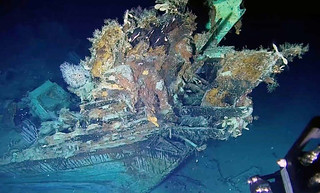 Colombia's army has shared unprecedented images of the legendary San Jose galleon shipwreck, hidden underwater for three centuries and believed to have been carrying riches worth billions of dollars in today's money.
Colombia's army has shared unprecedented images of the legendary San Jose galleon shipwreck, hidden underwater for three centuries and believed to have been carrying riches worth billions of dollars in today's money.
Four observation missions using a remotely operated vehicle were sent to the wreck at a depth of almost 950 meters (3,100 feet) off Colombia's Caribbean coast, the army said in a statement late Monday.
These missions, carried out by the navy under the supervision of the culture ministry, found the galleon untouched by "human intervention."
Cannons partially covered by mud are visible alongside porcelain crockery, pottery, glass bottles and also gold pieces.
A part of the bow can be clearly seen covered in algae and shellfish, as well as the remains of the frame of the hull.
Authorities said they had also discovered two more shipwrecks during their observation mission -- a colonial-era galleon and a schooner from the post-colonial period.
Colombia will face a challenge from Spain and an indigenous group in Bolivia to determine who keeps the bounty.
The San Jose galleon was owned by the Spanish crown when it was sunk by the British navy near Cartagena in 1708.
Before its discovery in 2015, it was long sought after by treasure hunters.
Experts believe it contains at least 200 tons of gold, silver and emeralds.
Colombia considers wrecks found in its territorial waters to be part of its cultural heritage, meaning the contents cannot be sold.
Spain insists that the bounty is theirs since it was aboard a Spanish ship, while Bolivia's Qhara Qhara nation says it should get the treasures as the Spanish forced the community's people to mine the precious metals.
Colombian authorities have announced their intention to create a museum of shipwrecks that would be "a source of pride for Colombia, the Caribbean and the world."
Recovering the wreck presents a technological and scientific challenge due to its depth.
Authorities have identified another 13 sites off the coast of Cartagena that they want to explore in search of other shipwrecks.
To read the complete article, see:
Colombia shares unprecedented images of treasure-laden wreck
(https://www.msn.com/en-us/news/world/colombia-shares-unprecedented-images-of-treasure-laden-wreck/ar-AAYbY4u)
Leon Saryan shared a Newsweek article about two other shipwrecks found near the San Jose. Thanks. -Editor
To read the complete article, see:
Two Ships Found Near Spanish Galleon Full of Gold Worth $17 Billion
(https://www.newsweek.com/two-ships-found-near-spanish-galleon-full-gold-worth-17-billion-1714432)
To read the earlier E-Sylum articles, see:
SAN JOSE GALLEON FOUND: THE HOLY GRAIL OF SHIPWRECKS
(https://www.coinbooks.org/esylum_v18n49a26.html)
SPAIN CLAIMS OWNERSHIP OF SAN JOSE GALLEON TREASURE
(https://www.coinbooks.org/esylum_v18n50a37.html)
COLOMBIA PLANS TO SALVAGE THE SAN JOSé
(https://www.coinbooks.org/v20/esylum_v20n28a25.html)
THE 1817/4 HALF DOLLAR
A Stack's Bowers blog article by Dave Bowers discusses the famous 1817/4 Half Dollar. -Editor
Classic rarities among American silver coins have commanded attention for a long time. The 1804 silver dollar, 1802 half dime (see No. 12), 1894-S dime, 1827 quarter, and others are highlights of any collection or auction in which they appear.
One of the most popular American specialties is Capped Bust half dollars with lettered edge. Designed by John Reich, these were minted continuously from 1807 until 1836, except for 1816 (a unique year in American coinage as only one denomination, the copper cent, was struck). Today members of the John Reich Collectors Society and others collect these by dates and major varieties as listed in A Guide Book of United States Coins, or by die varieties as described in Al C. Overton's Early Half Dollar Die Varieties, 1794-1836. The most famous variety, and by far, is the 1817/4 overdate.
However, it was not until 1930 that anyone had heard of it! In the October 1930 issue of The Numismatist, page 689, under "Editorial Comment-Numismatic News," was a summary of a letter received from a California correspondent:
E.T. Wallis, of Los Angeles, Cal., writes that he has recently discovered a heretofore unknown variety of the 1817 half dollar, the last figure of the date being cut over a 4. A number of half dollars of 1817 over '13 are known, but this is the first one over '14 reported, Mr. Wallis says.
He also says the coin is practically Uncirculated and the overdate can be seen plainly. The reverse is also an unlisted variety, as both I's in UNITED and AMERICA have the lower right ceriphs [sic] broken off diagonally toward the right, and the I in UNITED also has the left side of the top ceriph broken off. The obverse shows a die break across the coin, starting from the border to the right of the figure 7 and through the ear and between B and E of LIBERTY to the top of the border. Mr. Wallis thinks the die may have been cracked when the 7 was cut over the 4 and the die may have broken when the striking began.
Howard R. Newcomb, of Los Angeles, and M.L. Beistle, of Shippensburg, Pa., both authorities on the half-dollar series, have examined the coin and pronounced it a hitherto unknown variety.
Martin Luther Beistle was the leading half dollar student of his day. His name appeared on the cover of A Register of Half Dollar Die Varieties and Sub-Varieties, published in 1929. Howard R. Newcomb was generally acknowledged as America's leading scholar in the field of technical die varieties, especially with relation to his knowledge extending across many different series (most other die variety specialists were myopic, and may have been well versed in, say, 1793 large cents, but would not know a thing about an 1817 half dollar).
Wallis died in 1951. Al Overton purchased the discovery coin the next year, though he identified the source of the coin as the "Pratt Collection" and apparently never knew Wallis. Overton sold the discovery coin to Louis Eliasberg in 1953. In April 1997 Bowers and Merena Galleries presented the coin in their sale of the Louis E. Eliasberg, Sr. Collection.
In time, additional 1817/4 half dollars were discovered, so that by the time Stack's Bowers Galleries offered the D. Brent Pogue Collection coin in September 2015, cataloger John Kraljevich listed 11 examples, split between two varieties: Overton-102 and Overton-102a. It is worth mentioning that the 1817/4 half dollar included in the Pogue Collection – a cabinet known for the superior quality of its pieces – was graded "just" VF-35 and yet is by far the finest known of the Overton 102 variety. When the Overton 102a variety coins are included, this VF-35 is still the third highest graded, behind only the Discovery-Eliasberg specimen at AU-53 (PCGS) and the George Williams coin, graded XF Details, Environmental Damage by NGC.
To read the complete article, see:
The Once Unknown, Now Famous 1817/4 Half Dollar
(https://www.stacksbowers.com/News/Pages/Blogs.aspx?ArticleID=the-famous-1817-4-half-dollar)
REDISCOVERING ELIASBERG'S 1839-C HALF EAGLE
Ron Guth posted another Eliasberg Project progress report, this time on the 1839-C Half Eagle. Nice research. -Editor
It's always a great day when an Eliasberg coin is rediscovered. In this case, his 1839-C Half Eagle showed up in a random review of the Numismatic Detective Agency's (NDA) Condition Census for that date and mintmark. The coin itself has long been known as one of the finest examples, but the provenance was broken years ago and the Eliasberg connection was forgotten.
Like most of Eliasberg's coins, his 1839-C came from the Clapp Collection. In a perfect convergence of opportunity, timing, and wherewithal, Eliasberg bit a big bullet when he purchased the Clapp Collection intact in a mega-deal brokered by Stack's. Eliasberg went on to become the king of the numismatic hill when, in 1950, he completed a collection of all U.S. coins known at the time.*
Included in the Clapp Collection was a high-grade 1839-C Half Eagle. When Bowers & Ruddy sold Eliasberg's gold coins in 1982, the cataloger described his 1839-C Half Eagle thusly: Brilliant Uncirculated MS60 obverse; Choice AU55 reverse.
The coin sold for $6,325, which was a strong price for the time, but far short of the $16,000 realized by John Work Garrett's Choice About Uncirculated-55
in 1979. In an ironic twist, Eliasberg's 1839-C is now graded finer than the Garret coin (NGC MS63 vs. PCGS MS62, respectively).
As a near Mint State
example, Eliasberg's was considered one of the finest 1839-C Half Eagles, at a time when the Condition Census dipped down to the AU level. Today, the NDA Condition Census includes ten examples ranging in grade from MS61 to MS64. That means the Eliasberg example, not quite fully Mint State in 1982, would be overlooked by modern researchers as not being important enough.
However, plate-matching tells a different story.
After the Eliasberg sale, it is unclear – at least for several years – what happened to his 1839-C Half Eagle. Just under 20 years later, the coin showed up in Bowers & Merena's 3/2002 sale as an NGC MS62 (Lot 230), with no mention of the Eliasberg provenance. The coin can be identified by a nearly vertical line in the field just left of the eagle's head, some shallow scrapes in the field just to the right of Liberty's neck, and other marks and toning spots.
From there, the Eliasberg 1839-C Half Eagles has gone on a roller coaster ride, appearing in six auctions since 2002, reaching a high of $126,500 in February 2010, then losing over half its value in a 2012 auction where it sold for $48,875 as an MS63. No mention was made of the Eliasberg provenance in any auction after the 1982 sale.
From a purely numerical standpoint, the Eliasberg 1839-C Half Eagle is tied for second place in the NDA Condition Census with a PCGS MS63 and one other NGC MS63.
The current whereabouts of the Eliasberg 1839-C Half Eagle are unknown to us, but we hope the new owner will be happy to have the Eliasberg provenance attached to their coin.
Ron finishes the article with this teaser: "*In a future blog post, I question the long-held assertion that Eliasberg's collection was complete." -Editor
To read the complete article, see:
The Eliasberg Project: Rediscovering His 1839-C Half Eagle
(https://numismaticdetectives.com/blog/f/the-eliasberg-project-rediscovering-his-1839-c-half-eagle)
To read the earlier E-Sylum articles, see:
THE ELIASBERG PROJECT
(https://www.coinbooks.org/v24/esylum_v24n26a14.html)
THE ELUSIVE ELIASBERG 1858-S DIME
(https://www.coinbooks.org/v24/esylum_v24n40a20.html)
NOBEL PRIZE MEDAL SALE TO BENEFIT UKRAINIANS
In the June 7, 2022 issue of their Coin News newsletter, Heritage announced their upcoming sale of a Nobel Peace Prize Medal. -Editor
Dmitry Muratov, editor-in-chief of the influential Russian news outlet Novaya Gazeta, will auction his 2021 Nobel Peace Prize medal on June 20 through Heritage Auctions to benefit children and their families forced to flee Ukraine and those internally displaced since the start of the war in February. All proceeds will support UNICEF's humanitarian response for children in Ukraine and neighboring countries.
Bidding on the medal is open now, and it will conclude with a live auction at The Times Center in Manhattan on World Refugee Day, June 20, a day to commemorate the strength, courage and perseverance of refugees.
"The editors of Novaya Gazeta decided it was necessary to help those in desperate need," says Muratov, who in 1993 co-founded the Moscow-based publication that is now the last independent newspaper in Russia. "Everyone understood that we had to help, and the sale of the Nobel medal through Heritage Auctions gave us a powerful opportunity to help Ukrainian refugees. We hope that everyone around the world supports us and contributes to this movement, however they can."
Muratov shared the 2021 Nobel Peace Prize with Filipino journalist Maria Ressa. The Norwegian Nobel Committee celebrated their "fight for freedom of expression in a world in which democracy and freedom of the press face increasingly adverse conditions."
In late March 2022, Muratov was forced to suspend publication of Novaya Gazeta after receiving a second warning from the government agency charged with monitoring Russian news media. Muratov was subsequently attacked when an assailant splashed him with what The Washington Post described as "a mixture of red paint and acetone, leaving his eyes with a chemical burn."
This week, Muratov was named one of TIME100's Most Influential People of 2022.
Muratov announced on March 22 that he intended to auction his medal with all proceeds going to support humanitarian relief efforts for Ukrainian child refugees and their families, no matter where they are, prompted by the sight of "the wounded and children who need urgent treatment."
He cited the precedent made by physicist Niels Bohr, who in 1940 sold his Nobel Prize in Physics medal to benefit Finnish relief.
To read the complete article, see:
Heritage Auctions to Sell 2021 Nobel Peace Prize Medal Awarded to Russian Journalist Dmitry Muratov
(oins.ha.com/c/newsletter.zx?frame=no&id=6188#collector-b)
To read the complete lot description, see:
Dmitry Muratov 2021 Nobel Peace Prize Medal...
(https://historical.ha.com/itm/political/tokens-and-medals/dmitry-muratov-2021-nobel-peace-prize-medal/a/790-1.s)
THE BOOK BAZARRE
VATICAN MEDAL FOR UKRAINIAN WAR RELIEF
A World Mint News Blog article by Michael Alexander describes the new Vatican City medal for Ukraine. -Editor
The Vatican City State Mint has released an official medal on the theme of peace in Ukraine, and as a way to join calls for a return to dialogue. On the 24th February 2022, Russian armed forces began the war against Ukraine by crossing over internationally recognised borders and occupying Ukrainian territory.
The medals are produced by the Alberti Visconti SenesiMetals Manufacturing — AVS at their facilities in Pognano, Bergamo, on behalf of the Commercializzazione Filatelica e Numismatica — CFN and are designed by Orietta Rossi (obverse) and Daniela Longo (reverse). The obverse side depicts three generations of one family fleeing from a city destroyed by bombs with their entire lives in a suitcase, a child carries her stuffed toy and is guided by her mother who is walking towards us reminding us of a duty to comfort and show solidarity. At the top, in both Latin and Cyrillic texts are the words PAX – M?P (peace
). The reverse side depicts a dove of peace with an olive branch above the name of His Holiness Pope Francis and his coat of arms.
Each medal is priced at €50 and presented in a printed box with an image of Pope Francis.
The Commercializzazione Filatelica e Numismatica — CFN has advised that all proceeds from the sale of the medals will be donated to the foundation of the Holy Father for charitable work in favour of the Ukrainian people.
To read the complete article, see:
Vatican City: Silver medal released for fundraising and focuses on Ukrainian invasion and war relief
(https://world.mintnewsblog.com/2022/06/vatican-city-silver-medal-released-for-fundraising-and-focuses-on-ukrainian-invasion-and-war-relief/)
ELIZABETH II'S IMAGE ON BANKNOTES
This Bank of England Museum blog article explores Elizabeth II's image on banknotes throughout her reign. -Editor
On 6 February 2022, Queen Elizabeth II became the first British monarch to celebrate a Platinum Jubilee, marking 70 years on the throne. This June marks the 70th anniversary of her coronation, and we join the rest of the country and world celebrating her remarkable achievements as Queen.
You might be used to seeing the Queen's portraits on banknotes, but did you know the Queen is the only British sovereign to have appeared on banknotes issued by the Bank of England?
Let's roll back the years and find out how it all began…
In 1956, the Treasury granted permission for a new series of banknotes to feature the Queen's portrait. The first banknote including her portrait was the £1 note issued on 17 March 1960, followed by the ten shilling (10/-) note in 1961.
On both these banknotes the Queen is wearing the Diamond Diadem, a jewelled crown which she also wore on the way to her Coronation in June 1953.
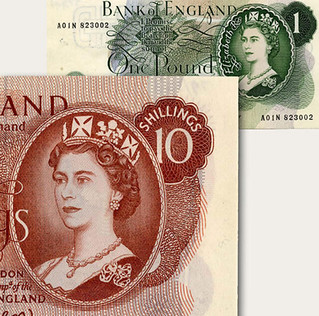 The original portrait was made by Bank of England note engraver, Robert Austin. In 1958, the design was finalised and sent to the Queen for approval. The Queen's Private Secretary wrote to the Bank of England on her behalf, noting that whilst she was pleased with the likeness overall, ‘her one and only objection is that the drawing of her face does not show the line of her jaw at all. It remains almost a plain white area…if this line could be indicated in any way, she thinks that it would be an improvement'. Unfortunately the jawline could not be amended without the risk of ruining the portrait and went to the printers unchanged (sorry Ma'am!).
The original portrait was made by Bank of England note engraver, Robert Austin. In 1958, the design was finalised and sent to the Queen for approval. The Queen's Private Secretary wrote to the Bank of England on her behalf, noting that whilst she was pleased with the likeness overall, ‘her one and only objection is that the drawing of her face does not show the line of her jaw at all. It remains almost a plain white area…if this line could be indicated in any way, she thinks that it would be an improvement'. Unfortunately the jawline could not be amended without the risk of ruining the portrait and went to the printers unchanged (sorry Ma'am!).
Unfortunately, this was not the end of criticisms of the portrait, as people thought that the Queen's facial expression looked severe and unrealistic. Bank of England Governor L.K O'Brien also complained that ‘there was too much hair, reduction of which might make the image look younger; the chest was too full, giving the Queen a portly look; the left eye did not seem to be looking in the right direction; the elimination of the extreme fullness of the face in the first portrait had given the line of the chin a slightly pinched effect; and the mouth needed a little softening…'
Yikes!
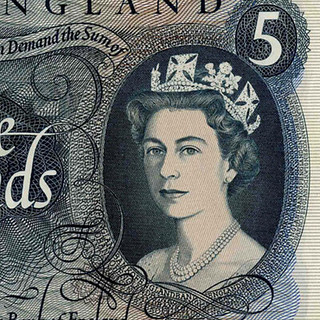 In 1963 a new £5 note was issued, followed by a new £10 note in 1964. Alan Reynolds Stone designed the portrait for these notes, and it was well received as it was thought to be more realistic and the Queen's gaze appeared more relaxed.
In 1963 a new £5 note was issued, followed by a new £10 note in 1964. Alan Reynolds Stone designed the portrait for these notes, and it was well received as it was thought to be more realistic and the Queen's gaze appeared more relaxed.
Interestingly, Stone specialised in woodcut engraving and lettering rather than banknote engraving, but he was still keen to take on the challenge. He wrote to the Bank of England saying that he was eager to learn how to work with the Bank's geometric lathes. These were machines used to create intricate patterns on the notes to make them harder to copy. Some examples of the patterns can be seen on the Series C £5 note designed by Stone, pictured above.
By the late 1960s the Bank was preparing for decimalisation which occurred on 15 February 1971. New banknotes were needed, and so, therefore, was a new portrait of the Queen. The proposed 50p note, pictured below, was designed by Harry Eccleston and shows the Queen wearing the hat and robes of the Order of the Garter. This time, the Queen's portrait is not in a frame and takes up more space on the note, making her portrait a much more prominent feature.
The banknote was never issued, however, as a 50p coin was created instead, which is a shame as the design looks fabulous!
To read the complete article, see:
Platinum-grade portraits: Exploring Elizabeth II's image on banknotes throughout her reign
(https://www.bankofengland.co.uk/museum/online-collections/blog/platinum-grade-portraits-exploring-elizabeth-II-image-on-banknotes-throughout-her-reign)
MORE QUEEN ELIZABETH II BANKNOTE PORTRAITS
The Sydney Morning Herald had another nice article about Queen Elizabeth II's banknote portraits. -Editor
Her face first appeared on banknotes in Canada in 1935 when she was just eight years old. Since then Queen Elizabeth II has featured on the currencies of at least 33 countries, with portraits depicting her up to the age of 90.
Now at 96, the Queen is celebrating her Platinum Jubilee - or 70 years on the British throne. Here's a look at her life through the notes of Commonwealth countries and former British colonies.
Canada $20, first issued 1935
The Queen was still Princess Elizabeth when she first appeared on a banknote while her grandfather King George V, was monarch.
Canada $20, first issued 1935
Shirley Templefor the curls which resembled those of the child actor - was taken by royal photographer Marcus Adams using a camera built to look like a toy cabinet. Adams operated the device remotely while talking to the children. Cayman Islands $1, first issued 1974
This was the first portrait of the Queen to feature on Cayman Islands currency after the country stopped using Jamaican coins and banknotes in 1972. The Queen is still on all Cayman Islands banknotes, with the latest series showing the Queen at 73. New Zealand $1, first issued 1989
The portrait of the Queen used on all New Zealand banknotes was updated in the 1980s when the country changed its note printer from a London-based company to one based in New Zealand.
To read the complete article, see:
How the Queen changed the face of money
(https://www.smh.com.au/interactive/2022/how-the-queen-changed-the-face-of-money/index.html)
AUSTRALIAN BANKNOTE FLUORESCENT INK IMAGES
Australian social media users went into a spin after someone discovered that every Aussie banknote features a hidden image. -Editor
Reddit users went into a spin on Monday after a sleuth discovered that shining a UV light on Aussie banknotes revealed hidden images of birds.
Reddit user C_Horse21 made the discovery with a $100 note and shared it online, quickly racking up over 2400 upvotes
and setting off a frenzy in the comments.
Man, American banknotes are boring as f**k,
one user said, decrying the lack of National Treasure-styled secrets on the iconic US greenback.
For all everyone had a go at the new $5 when it came out, our banknotes are actually pretty damned cool,
said another.
Every Australian banknote includes three invisible
features - a bird, serial number and year of print - created using fluorescent inks.
Each note has a different bird: the eastern spinebill honeyeater ($5), cockatoo ($10), kookaburra ($20), black swan ($50) and owl ($100).
While the hidden bird may have prompted a wave of conspiracy-like excitement, it's actually one of several unique security measures built into the design of our notes to combat forgery.
Read on for a detailed list of what other Easter eggs are contained on the loose fiver sitting in your pocket, as well as how to spot a fake.
To read the complete article, see:
Secret images hidden on your cash revealed
(https://www.news.com.au/finance/money/wealth/secret-images-hidden-on-your-cash-revealed/news-story/bcd54d8360b3f2fce3b9542a6eb0fb60)
LOOSE CHANGE: JUNE 12, 2022
Here are some additional items in the media this week that may be of interest. -Editor
We're discussed the physical cryptonotes offered by Noteworthy, a startup company that hired an all-star cast of professionals to design their product. This article says the notes were to be unveiled at a conference this past week. -Editor
Noteworthy, the premier architect of physical cryptonotes is excited to announce the next phase of its project with the official reveal of its 1 bitcoin cryptonote. Created by cryptocurrency pioneer Peter Vessenes and former Director of the Bureau of Engraving and Printing within the U.S. Treasury Larry Felix, alongside the foremost designers and innovators in central banking and currency printing, the notes are available for reservation and will be ready for purchase later this year.
Noteworthy Founder Peter Vessenes and MyEtherWallet Co-founder Kevin Monahan will be presenting the cryptonotes during a fireside chat on Thursday, June 9 at 5:30 p.m. Peter will be available for comment or interview on-site from June 9 - June 11.
Noteworthy notes are intricately designed and counterfeit-resistant without compromising quality. The front of the cryptonote will notate the type of the cryptocurrency, while the back is adorned with abstract concepts that represent the contemporary vision of the project. Swiss franc designer Manuela Pfrunder created each cryptonote with intentionality of design - seeking to combine color schemes and graphics that effectively represented the essence of blockchain technology. Each 1 bitcoin cryptonote contains a secure cryptographic microcontroller and offers a comprehensive suite of the banknote industry's most advanced security features.
But as of this writing I haven't seen any post-event publicity with more information or an image of the notes. Anyone? -Editor
To read the complete article, see:
Noteworthy to Unveil its Groundbreaking Physical Cryptonote at CoinDesk's Consensus Conference
(https://www.yahoo.com/now/noteworthy-unveil-groundbreaking-physical-cryptonote-155900102.html)
To read the earlier E-Sylum articles, see:
BITCOIN BANKNOTES
(https://www.coinbooks.org/v24/esylum_v24n11a32.html)
DESIGNING A BITCOIN BANKNOTE
(https://www.coinbooks.org/v24/esylum_v24n28a34.html)
They've found the maker of that controversial Maryland State Police challenge coin we discussed last week. -Editor
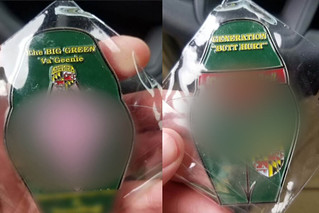 Officials from Maryland State Police said they have identified the individual who created and distributed a
Officials from Maryland State Police said they have identified the individual who created and distributed a Challenge Coin
inscribed with the Maryland State Police logo along with graphic imagery and offensive language.
In a statement Wednesday, authorities said their investigation found the design and manufacture of the coin were coordinated by a former member of the Maryland State Police, who left the Department in 2012.
The coin in question displayed the state police insignia with an illustration of a woman in thong underwear. The words I'm offended
are printed on the underwear and the words Generation Butt Hurt
appear above the drawing.
To read the complete article, see:
Maryland police say creator of offensive ‘challenge coin' identified
(https://wtop.com/maryland/2022/06/maryland-police-say-creator-of-offensive-challenge-coin-identified/)
To read the earlier E-Sylum article, see:
MARYLAND CHALLENGE COIN PROMPTS PROTESTS
(https://www.coinbooks.org/v25/esylum_v25n23a29.html)
Ya gotta love the clever graphic in this article from the Baldwin's Bulletin. -Editor
It sounds like the plot of a bizarre TV drama. A well-connected antiques dealer with a penchant for Savile Row suits is arrested on forgery allegations. Then more details emerge: the staff of Moses is among the ‘rare' items he's offering for sale. Numismatists can also purchase two of the 30 silver coins that Judas was paid for betraying Christ. Amazingly, this isn't fiction. It's a true story involving Kochi resident Monson Mavunkal, who was arrested last year.
Even without bizarre cases such as the Judas silver, the world of coin collecting and buying is no stranger to con artists out to make money. It's said that the first coins, minted around 600BC in what is now Turkey by King Croesus, created an instant market for forgeries. And it's been an ongoing fact of numismatic life ever since, which can make the world of dealing and collecting even more difficult to negotiate.
Added into this problematic mix in 1995 was the huge online marketplace that is eBay. This boasts an estimated two billion daily transactions, making it difficult to police… meaning the treacherous can more easily exploit the trusting. Should numismatists avoid it and its imitators at all costs? We sought expert advice…
To read the complete article, see:
BUYERS BEWARE? NAVIGATING THE WORLD OF RARE COINS ON EBAY
(https://www.baldwin.co.uk/news/buyers-beware-navigating-the-world-of-rare-coins-on-ebay/)
FREDDIE MERCURY'S STAMP COLLECTION
We've often discussed celebrity coin collectors, and once before we also mentioned this celebrity philatelist whose collection is being highlighted by Britain's Postal Museum. -Editor
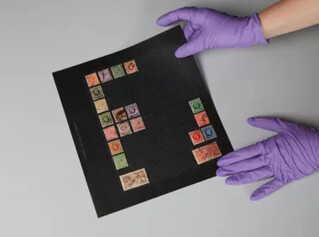 All Queen fans know how much Freddie Mercury liked to ride his bicycle but fewer are aware of the flamboyant frontman's other great childhood hobby: collecting stamps.
All Queen fans know how much Freddie Mercury liked to ride his bicycle but fewer are aware of the flamboyant frontman's other great childhood hobby: collecting stamps.
Now, for the first time, the Postal Museum is to put one of Mercury's priceless
collector's albums on show – its value enhanced by the fact that it is one of the late rock star's rare personal possessions in museum ownership.
The stamps that the young Mercury grouped together are unusually shaped into patterns on each page, and will be on view to the museum's visitors in London from 13 July. The display is part of the city's celebration of the 50th anniversary of the Pride movement in Britain.
Mercury, who died of Aids in 1991, was born Farrokh Bulsara in Tanzania in 1946. He spent his early life in Zanzibar, where his father, Bomi, worked for the British Colonial Office. Mercury inherited his father's passion for stamps and is thought to have collected between the ages of nine and 12.
Many of his stamps are from British Commonwealth territories, with some from eastern Europe, and they often reflect his early life. The real value of this collection is not in the stamps themselves but in its rich historical value and connection to one of the world's greatest ever entertainers. As pop memorabilia and for cultural reference, Freddie Mercury's collection is priceless,
the museum's senior archivist, Gavin McGuffie, has said.
All 54 pages of Mercury's album will also be available online this summer on the museum's website.
Eight years after Mercury's death, his creative legacy was marked with his own commemorative stamp, but the image became controversial, with one Daily Mail columnist criticising the Royal Mail for honouring the star's degenerate lifestyle
. Other stamp aficionados were upset that Roger Taylor, Queen's drummer, could be seen in the background. Guidelines for official stamps included a stipulation that the only living persons who can be depicted on a stamp are members of Britain's royal family.
The offending stamp was part of a millennium series in 1999 to recognise famous Britons of the last 1,000 years.
To read the complete article, see:
Freddie Mercury's ‘priceless' stamp collection to be celebrated
(https://www.theguardian.com/music/2022/jun/11/freddie-mercurys-priceless-stamp-collection-to-be-celebrated)
To read the earlier E-Sylum article, see:
FREDDIE MERCURY, PHILATELIST
(https://www.coinbooks.org/v21/esylum_v21n48a29.html)

